|
11/20/2025:
Senate Prospects For 2026: Part Two, Voting Schemes and Pipe Dreams
[RightDataUSA]
|
We've already covered the eight U.S. Senate seats which have the greatest probability of changing hands in 2026. The list includes 3 seats currently held by Democrats and 5 which have GOP incumbents. Most of the other 27 Senate seats which will have elections next year appear to be perfectly safe for the party which holds them. A few others fall just short of "perfectly safe".
Perfectly safe (or close to it) Senate seats:
- Republican: Alabama, Arkansas, Florida (special), Idaho, Kansas, Louisiana, Mississippi, Montana, Oklahoma, South Carolina, South Dakota, Tennessee, West Virginia, Wyoming
- Democrat: Colorado, Delaware, Illinois, Massachusetts, New Jersey, New Mexico, Oregon, Rhode Island, Virginia
A couple of states which are neither likely to flip nor quite 100% safe are Nebraska and Minnesota. We will also cover a few other states below -- Louisiana because of its "new" voting scheme which finally abandons the jungle primary; Alaska because it may be a close race and because of its utilization of the Rigged Choice Voting scheme which could determine the Senate winner there; also Kentucky because that's on the Democrat pipe dream list along with Alaska and Nebraska. Kentucky has one Democrat who can win statewide and he's already occupied with being a figurehead Governor who covets higher office someday -- but not the Senate, at least not in 2026.
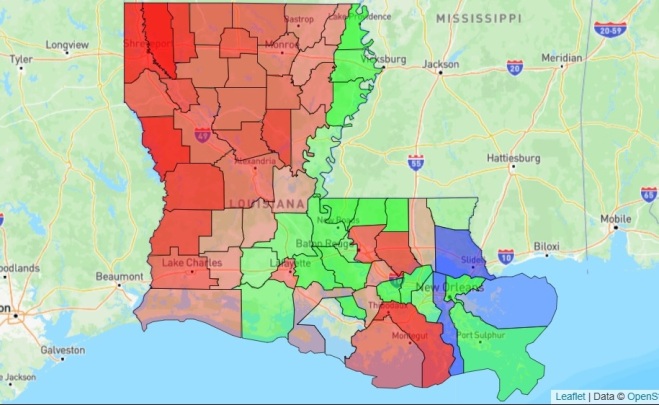 Louisiana gubernatorial jungle primary, 1987
Louisiana gubernatorial jungle primary, 1987
Louisiana:
This Senate seat is highly unlikely to slip away from the GOP next year, but it may be an interesting race.
As of 2026 Louisiana is abandoning its "jungle" primary system which was instituted in 1975 by Democrat Governor (and eventual convicted felon) Eddie Edwards. Louisiana is returning to single-party closed primaries, and that sounds like a good thing.
But it probably isn't.
In 1975 Republicans accounted for less than 10% of the Louisiana electorate and were outnumbered by as many as 2,000,000 Democrats statewide. From the end of Radical Reconstruction, Republicans were never anything close to being a viable factor in Pelican State elections. The GOP had not elected a Governor since 1876 and would never elect a Senator prior to the 21st century. Until the 1960's, Republicans were unheard of in the congressional delegation or in the state legislature. In these respects, Louisiana was no different from many other Deep South states.
By 1975 however, Edwards may have noticed that the GOP (though still largely nascent) was beginning to grow, and the Democrat Governor desired to rig the system to favor his party. In a jungle primary, all candidates regardless of party run together on the same ballot. The top two finishers -- also regardless of party -- advance to the general election which is essentially a runoff. A wrinkle which was added in Louisiana is that if any candidate achieves a majority of the vote in the jungle primary, then that candidate is declared the winner of the race and there is no general election for that office. An example of how this worked is the 2020 U.S. Senate election, in which RINO Bill Cassidy was re-elected.
In the jungle primary which took place on November 3, 2020, Cassidy faced 14 challengers (5 Democrats, 1 Republican, 1 Libertarian, 7 independents), exactly zero of which posed a serious threat -- all 5 Democrats combined added up to only 36% and the one other Republican contender barely registered a pulse. Cassidy won with 59.3% of the vote. Had his percentage not exceeded the magic number of 50, he would have been forced into a runoff with the second-place finisher.
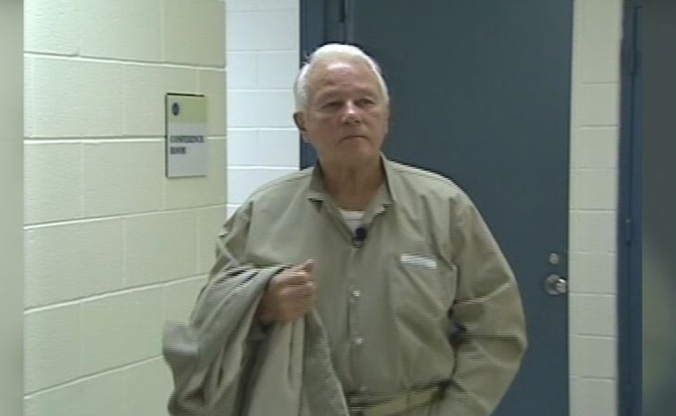 Photo of inmate No. 03128-095 from wwltv.com
Photo of inmate No. 03128-095 from wwltv.com
What really triggered Edwards was the February, 1972 gubernatorial race, in which he first won the Democrat primary against over a dozen other candidates (but did not even get 25% of the vote) and then narrowly prevailed in a grueling runoff against Bennett Johnston and then had to face Republican David Treen in the general which turned out much closer than expected. Treen had cruised easily through the GOP primary and did not need to endure any runoff. So why, Edwards asked, should the vastly outnumbered Republican party be guaranteed a spot on a general election ballot like in every other state, while Democrats had to face as many as two bruising contests just to get to that same spot?
The answer to that question, beginning in 1977, was to make Republicans in Louisiana into an effectively-disenfranchised minority group. Until the 1990's, the majority of statewide general elections in Louisiana were Democrat against Democrat. Furthermore, when no general election was needed because someone got over 50% in the jungle primary, that "someone" was always a Democrat.
This contrivance worked well for Louisiana Democrats for a long time. But Treen was elected Governor in a 1979 upset and by the 1980's the GOP at least fielded a candidate in most elections. Although after Treen won it was 16 years before another Republican was elected Governor, and it wasn't until 2004 that Republicans elected their first U.S. Senator from Louisiana. Democrats continued to dominate other statewide offices as well.
As of 2004 the tide had turned, and Democrats (and liberal Republicans) knew it. Then came the mass exodus of New Orleans Democrats as the result of Hurricane Katrina in 2005; New Orleans was already in population decline but the hurricane momentarily accelerated the process. From that point forward it has been Democrats who almost always find themselves on the outside in a general election, not simply because New Orleans temporarily lost about 100,000 potential voters, but because the general preference of Louisiana voters has done a 180-degree turn away from Democrats and towards Republicans. Since 2007 only Dirty Mary Landrieu in 2008 and John Bel Edwards (fluke wins in 2015 and 2019) have been able to prevail statewide as Democrats in Louisiana.
Liberal Republicans like Bill Cassidy have (along with Democrats) lately decried the jungle primary, and in 2024 the state legislature passed a bill which reverts to closed, single-party primaries for elections for federal offices effective as of 2026; elections for state and local office in Louisiana will continue with the jungle primary. The new scheme is a "win" for liberals of both parties: Democrats get a guaranteed spot on a general election ballot; RINOs no longer need to deal with Democrats taking votes from them in a primary, and thus stand a better chance against real Republicans.
In a supposedly "closed" GOP primary, Cassidy will receive a higher percentage of votes than he would in a jungle. He will be the winner if several conservative candidates split the right-wing vote while Cassidy has all of the left-wing votes for himself. Most likely, however, Cassidy will still need to survive a primary runoff. That won't be as difficult as it may sound. One very important provision of the new law which eliminated the jungle primary is that independent voters -- and there are plenty of those in Louisiana (nearly 30%) -- can cast a ballot in whichever primary they choose. Take a bunch of "moderate" independents, add in some Democrat voters who switch and become Republicans temporarily, and RINOs are suddenly far less endangered than they were before. If Cassidy's fate was decided only by true Republicans, it wouldn't be pleasant for him.
Cassidy's #1 opponent at the moment is state Treasurer John Fleming, a 74-year-old Republican. Democrats have nobody worth mentioning. Fleming served 4 terms in the U.S. House from the 4th District from 2009-2016; the guy who replaced Fleming in that district in 2016 is now the Speaker of the House. Fleming is a very solid conservative, and if other conservatives stay out of the May, 2026 Senate primary, Fleming has an excellent chance to win. November would be a formality. But the primary will not be so simple, and that works to the advantage of RINO incumbent Cassidy because the non-RINO primary vote will be fractured. Other prominent candidates include first-term state Senator Blake Miguez, who is a moderate-conservative; and St. Tammany Parish councilwoman Kathy Seiden, who is a young, attractive Christian conservative.
 Photo credit: wwltv.com
Photo credit: wwltv.com
Cassidy has a major cash advantage, Miguez and Fleming are building their war chests, and Seiden has only recently thrown her hat into the ring. Whoever wins the GOP primary will be Louisiana's next U.S. Senator. Miguez, though more of a centrist, will still take more votes from Fleming and Seiden than he will from Cassidy. Best case scenario is that at least one of the two actual conservatives makes the runoff. With one Democrat now guaranteed to be on the general election ballot (thanks again, Louisiana RINOs) billionaire ActBlue contributors may go all-out to try to steal this seat, but this is one state where it is very unlikely that they will succeed.
Alaska:

Democrats have nobody yet for this race in what people falsely assume is a Republican state; the GOP has only 24% of voter registrations in Alaska while 59% are registered independents. But the Democrats believe (and left-wing polls back them up) that fake-moderate ex-congresswoman Mary Peltola would be a formidable opponent against incumbent Republican Dan Sullivan. Sullivan, an actual moderate, was first elected to the Senate in 2014 when he defeated incumbent Democrat Mark Begich and then was re-elected in 2020 by an unimpressive margin over big-spending liberal Al Gross.
An obscure former state legislator from the outback, Peltola entered the spotlight in August, 2022 when she reaped the full benefit of Alaska's Rigged Choice Voting (RCV) election system and won the House seat of the departed Don Young by taking 39.7% of the vote in a special election. Sarah Palin's entry into that race split the GOP vote (which totaled 58.7%), and after RCV worked its black magic Peltola was declared the winner. She won again in November against the same two GOP combatants. Republicans finally got smart in 2024 and stopped the internal warfare, with Nick Begich winning the House seat he had been denied twice previously. Democrats desperately want Peltola to run for something in 2026, whether it be Governor, Senator or House, because no other Democrat seems to be remotely viable. Alaska's filing deadline isn't until June, so the "Peltola Watch" may go on for some time.
Peltola may have a greater chance at becoming Governor rather than Senator because no Republican (so far) is stepping up to plausibly challenge Sullivan; the GOP vote will not be split, and Sullivan's squishiness will appeal to so-called independents who might otherwise vote for a Democrat. However the Governor race is wide-open and numerous Republicans will be splitting the vote in the jungle primary and probably in the general election too. If Peltola gets into that race, other Rats will flee. The over-abundance of Republican wannabes gives Democrats and Peltola the perfect opportunity to use Rigged Choice Voting to their advantage again, a la 2022.
Even if Sullivan wins another Senate term in 2026, Alaska still might hand Senate control to the Democrats. As we first predicted over 3 years ago, if Senate control hangs in the balance, uber-RINO Alaska Senator Lisa Murkowski will almost certainly switch parties -- either ending her charade and becoming a Democrat, or going the Independent route and caucusing with the Dems -- and hand the Senate over to the Rats. The GOP majority hasn't been thin enough yet for this grandstanding attention whore to make any difference in that manner, but after 2026 it very well might be. Or Republicans may lose outright, and Murkowski might switch just to be on the winning team and get some better committee assignments in the last two years of her final term (before voters kick her to the curb in 2028 -- hopefully).
Murkowski previewed her intentions here, a few months ago.
Kentucky:
 Photo credit: Lexington Herald Leader
Photo credit: Lexington Herald Leader
The Bluegrass State is wide open due to the long-overdue retirement of Mitch McConnell. The best-known candidates in the Republican primary are moderate congressman Andy Barr and former Attorney General Daniel Cameron. Barr has represented the Lexington-area district in Congress since 2013 and he's turned what was once a marginal House seat into a rather safe one which Democrats no longer seriously go for in most elections; they are putting it back on their radar in 2026, however. Cameron, elected as A.G. in 2019, was seen by some on the right as insufficiently tough on Democrat crimes while in office, and his bid to move up to Governor ended dismally when he was totally outclassed (and vastly outspent) in 2023. There is also businessman Nate Morris running on the GOP side, and he is definitely the most conservative option of the three. Barr is currently the leader in the fundraising portion of the race.
Democrats seem to be pinning their hopes on one of two female statewide failures:
- Amy McGrath, who once wasted $8 million running against Barr in the 6th District and couldn't even win in hyper-Democrat 2018. The national party again spared no expense in 2020, spending nearly $100 million on McGrath as she failed to defeat the unpopular McConnell for the Senate. She won 3 counties. McGrath's 2026 campaign is built around "I hate Donald Trump, just like you do!" and nothing else aside from wrapping herself in the flag and posing as a patriot because she once was in the military. Democrats often try that approach; it seldom works outside of "blue" states (where that sort of thing isn't necessary and is probably counterproductive).
- State House Minority Leader Pamela Stevenson, who represents a Louisville ghetto district. Stevenson doesn't appear to have much of a campaign organization yet. Stevenson ran for Attorney General in 2023 and lost by 16 points even as Empty Suit Andy Beshear was winning at the top of the Rat ticket. Stevenson, like McGrath, also has military cred, having once been in the Judge Advocate General's Corps in the U.S. Air Force.
- There is also former CIA spook Joel Willett, the Deep State entrant into the race; Kentucky's version of Virginia's Abby Spanberger, but without any electoral history. He's trying to seize the all-important Democrat "Working Class Hero" (W.C.H.) designation for himself, and also has the "victim card" handy; this guy who nobody's ever heard of is apparently such a menace to GOP chances in the 2026 election that he claims to have received death threats from Republicans.
A recent addition on the Democrat side, presumably for additional comic relief, is horse trainer Dale Romans. Horses are big in Kentucky, and this guy's full of as much horseshit as any of them. He also wants to be the W.C.H. candidate in the contest, and describes himself as an "independent" Democrat even as he spouts the same nonsense as all other (presumably non-independent) Democrats. Bernie Sanders is an "independent" too.
McGrath is the most likely of the above to be the Democrat nominee, but nobody currently has any illusions that she will win. Morris may have a better shot than anticipated on the GOP side, but a squish like Barr probably has the best chance of winning a general election, and therefore the big money and big endorsements will be behind him. Cameron is currently being slimed with unproven allegations of misconduct while Attorney General, and he is also a proven statewide loser. Cameron appears to be the favorite to finish third in the GOP primary.
Minnesota:
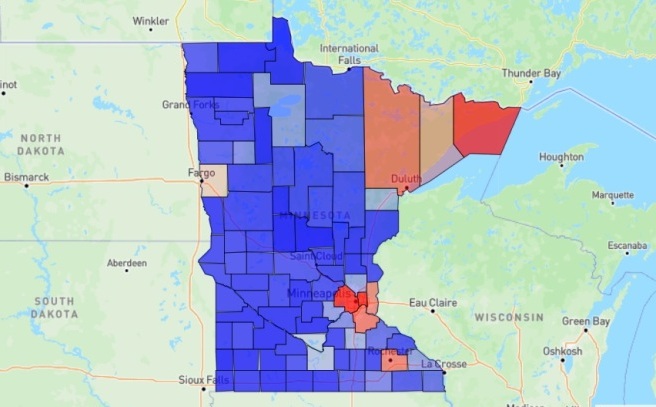 2024 presidential results in Minnesota
2024 presidential results in Minnesota
This state, like Virginia (see below) is nothing but a Republican pipe dream. The congressional delegation is always pretty well balanced, either 4-4 or 5-3 every election since 2000. The state House and state Senate are very close. Minnesota doesn't register voters by party, but a company whose business it is to estimate party breakdowns calculates that Minnesota is one-third Democrat, one-third Republican and one-third independent or minor parties. This may be an oversimplification, but the Twin Cities and their suburbs (at least the first two "rings") are terrible, the rest of the state is fine. The first part of that sentence is definitely true, anyway.
When it comes to statewide elections, the GOP sometimes comes close -- but never wins. Trump won every single county in Minnesota except 4 in the Twin Cities area, 3 in the Arrowhead Region, and the counties containing Rochester and Moorhead. He still lost by 4 points, which isn't too bad a showing for a Republican in the Great White (75% and dropping) North. But the last time a Republican presidential candidate won in Minnesota was back in 1972 -- 53 years ago. There's usually some hope but it's always false hope.
It's no different in other statewide elections. From 2008 to 2024 there were 23 non-presidential statewide elections in Minnesota, for offices ranging from Governor and U.S. Senator to Auditor, Attorney General and Secretary of State. Only one candidate (Amy Klobuchar) has ever exceeded 55% of the vote during those years, and she's done that 3 times. The other 20 elections were close. Democrats won all 20 of them.
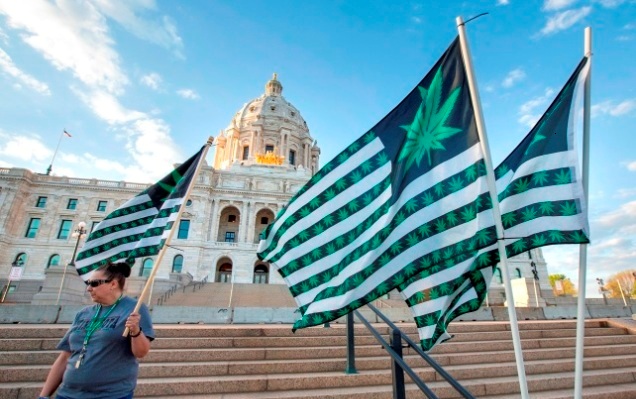 Photo credit: house.mn.gov
Photo credit: house.mn.gov
Speaking of "pipe dreams". . . one explanation for some of the previously close outcomes is -- or was -- the presence of doper parties on the ballot. The "Grassroots-Legalize Cannabis" party and the "Legal Marijuana Now!" party are both recognized political entities in Minnesota, but they ceased fielding candidates after 2022. That's because they no longer have any reason to do so; in 2023 the Democrat legislature passed a very lenient law which legalizes cannabis for any type of use, not just medicinal. The fact that the doper parties are now obsolete helps Democrats, because these parties were regularly siphoning off thousands of left-wing votes in major elections.
Republicans are pretending that they have a chance to pick up the Minnesota Senate seat in 2026. It is an open seat, being vacated by Democrat Tina Smith, who is retiring. Smith, who compiled a nearly 100% liberal rating while in the Senate, was first appointed in 2018 when Democrats forced another liberal Democrat, sexual predator Al Franken, to resign. Smith's most recent election in 2020 was a good example of how Democrats were once hindered electorally, as two stoner candidates combined to take 7.7% of the vote away from her. So Smith only won by about 5 points instead of 12 or 13 points.
The 2026 Democrat primary will be between Lt. Governor Peggy Flanagan and congresswoman Angie Craig. Flanagan has some problems, such as financial improprieties in her office, and being endorsed by Bernie Sanders; Craig is one of those lifelong liberals who suddenly sprints hysterically towards the center when seeking higher office. There's a 98% chance (rounding down) that one of these two will be the next ultra-liberal U.S. Senator from the state of Minnesota.
Ex-professional basketball player Royce White ran for the Senate in 2024 in Minnesota against Amy Klobuchar, and the Republican was stomped by over 15 points, a good example of a margin of Democrat victory when the dopers no longer split the left-wing vote. He is running again in 2026. White moved quickly across the political spectrum, going from left-wing hero in 2020 when he was leading Black Lives Matter protests after the death of "St. Floyd of Fentanyl" (White does have a history of mental illness); he's recovered from that, and is now described as a "right-wing populist". White has just as much chance of winning in 2026 -- none at all -- as he had in 2024. And he is the probable front-runner among Republicans, which shows just how much of a barren wasteland Minnesota is for the GOP. None of the state's 4 moderate Republican congressmen want any part of this race either.
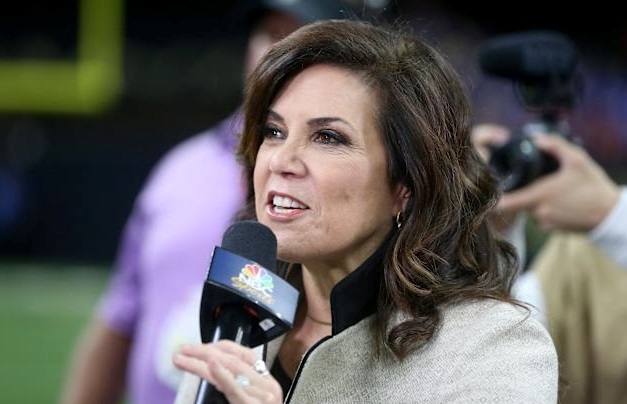 Photo credit: yahoo.com
Photo credit: yahoo.com
This foregone conclusion of an election might be spiced up a bit if ex-sports broadcaster Michele Tafoya were to enter the race on the GOP side. Tafoya was a long-time sideline reporter for NFL games, and during her career she was employed by several networks including CBS, ESPN and NBC. She retired from that profession in January, 2022; the last game she worked was Super Bowl LVI.
Tafoya, a self-described "pro-choice conservative with Libertarian leanings", is now a political commentator, doing podcasts from her home in the suburban Twin Cities area. She has been rumored as a potential candidate for the Minnesota Senate seat, but has not yet made any move towards running. The main challengers to White for the GOP nod are a pair of retired Navy veterans, Adam Schwarze and Tom Weiler, neither of whom have any political experience -- which isn't necessarily a bad thing -- but they have no name recognition (or sufficient funding, or a prayer of winning) either.
Nebraska:
 Photo credit: Zach Wendling/Nebraska Examiner
Photo credit: Zach Wendling/Nebraska Examiner
Democrat-in-disguise Dan Osborn is the Great "Independent" Hope for the left in the state of Nebraska. Fresh off of a defeat in the 2024 Senate election against incumbent GOP squish Deb Fischer in which he came closer than some expected, Osborn is rested and ready to give it another go in 2026. Osborn took all of the Democrat money he could get in 2024, but concealed his true political identity by refusing to accept the Democrat party label which is repugnant in the Cornhusker State outside of Omaha and Lincoln. Not even including all of the supposedly-independent liberal cashflow coming from outside the state, Osborn's fundraising dwarfed that of Fischer. Numerous polls showed a close race in 2024, and some even had Osborn prevailing by a small amount. Osborn won the two big liberal cities and lost everywhere else; the final outcome was a 6.7% victory for the Republican. Only one or two forecasters actually got it right; the other polls (nearly all of which were paid for by Osborn's campaign) were nothing but wishful thinking, propaganda and hot air.
Osborn's opponent in 2026 will be Nebraska's other squishy moderate Senator, Pete Ricketts.
Ricketts, the former two-term Governor of Nebraska, was appointed in January, 2023 to fill the Senate vacancy caused by the resignation of rabid Trump-hating Republican Ben Sasse. Ricketts then easily won the 2024 special election to fill the remainder of Sasse's unexpired term.
That effortless win came against a Democrat, and defeating any Democrat statewide is a slam dunk in Nebraska these days. In 2024 the national party kept its support of Osborn a secret until the final days of the campaign. National Rats are now out of the closet, and have proudly endorsed the faux independent for 2026. They have yet to support Osborn with the big money which will enable him to easily outspend Ricketts (but that will come). For his part, Osborn is careful to appear in flannel shirts, holding a hunting rifle if possible, and making sure to stress that he was once a member of Organized Labor. So unlike most Democrat "working class hero" wannabes, this guy really did once-upon-a-time work for a living before becoming a politician.
Just like in 2024, the polls purport to indicate a close race. Just like in 2024, those biased polls are very likely to be wrong when the votes are counted. But Democrats have all the money in the world, as they have conclusively shown in recent years, so why not spend it -- even on an "independent", even in a normally unwinnable state?
Because 2026 just might not be a normal election year.
Virginia:
One last word about a ridiculous GOP pipe dream state: there are probably some folks out there who are still in disbelief regarding the 2025 election results in Virginia. Unwilling to accept the reality that the Old Dominion is not remotely competitive anymore, they may think that outgoing Republican Governor Glenn Youngkin could somehow repeat his fluke win from 2021 in the 2026 Senate race against well-entrenched liberal Mark Warner.
Youngkin is a good man, and he stood up just recently against Virginia Democrats' attempt (which will succeed) to gerrymander the state's congressional districts and disenfranchise Republicans, costing them 2 or perhaps 3 seats. Youngkin is not a stupid man, and to all indications will not be entering a Senate race that he is extremely unlikely to win. If Youngkin declines, Republican pickup chances of the Virginia Senate seat drop from maybe 20% to absolute zero. Drop the pipe, wake up from the dream, and look elsewhere for potential Republican pickups.
Tags:
2026
Senate
Louisiana
Alaska
Kentucky
Minnesota
Nebraska
Virginia
|
|
11/13/2025:
An Electoral S.A.T. Math Question: "2025 Is To 2017 As 2026 Is To ____ ?"
[RightDataUSA]
|
The election results from November 4, 2025 bear a striking resemblance to those from November 7th of 2017. In the aftermath of the 2025 Democrat sweeps in Virginia, New Jersey, New York City -- and elsewhere -- most right-wing analysts are trying to appear calm as they whistle past the graveyard in their attempts to dismiss the disaster as "completely expected", "limited to 'blue' states", "unimportant" and, most of all, "meaningless as far as next year's midterms are concerned".
If that's what most analysts are claiming, then most analysts are wrong.
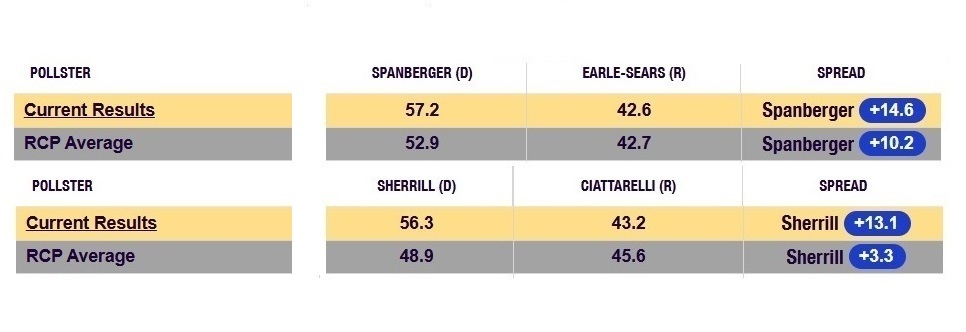 The polls sure were wrong -- but not the way we wanted them to be.
The polls sure were wrong -- but not the way we wanted them to be.
"Completely expected":
An election day puff piece about new RNC Chairman Joe Gruters claimed there were going to be "close contests for Governor in New Jersey and Virginia" and Gruters trumpeted GOTV efforts by Republicans in those states. Of course the races turned out to be not so close except in some pre-election outlier polls like this one, and the GOTV effort was apparently quite insufficient. The margin of defeat was so great that even the usual "Frodd! Frodd! Frodd!" claims aren't being made, except by those for whom facing reality isn't exactly a strong point. This isn't 2020.
Numerous prognosticators understood that the GOP candidates were likely to lose this year in VA and NJ, but who the hell had 13 points as the margin of defeat in New Jersey? We sure didn't. One ridiculously biased Rutgers poll back in June had Ciattarelli losing by 21 points, however polls which showed him neck-and-neck with the Democrat Top Gun were also way off the mark. Most New Jersey pollsters had forecast a race that would wind up within, or close to, the margin of polling error.
In Virginia, only hardcore GOP surveyors such as Trafalgar ever had Winsome Sears coming within spitting distance of the Governor's mansion in Virginia, and as election day loomed, even they bailed on her chances. Trafalgar still had the Virginia Lt. Governor race being close (it wasn't), and had Jason Miyares being narrowly re-elected (he wasn't) as Attorney General against savage Democrat Jay Jones.
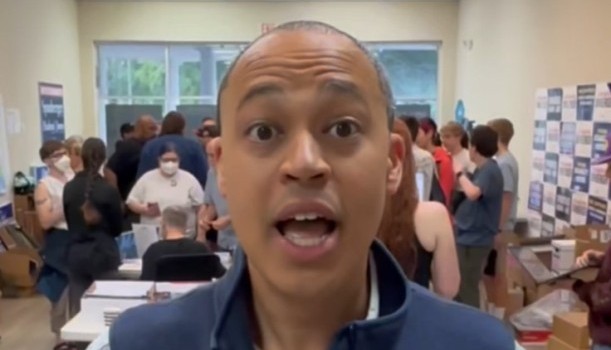 Possibly thinking: "Wow, the voters agreed with me! Republicans (and their children) DO deserve to die!"
Possibly thinking: "Wow, the voters agreed with me! Republicans (and their children) DO deserve to die!"
Regarding the Republicans' gubernatorial defeats: it's one thing to be expected to lose, it's another thing to be completely obliterated and to have the calamity permeate the entire election ballot to the point where Republicans also hemorrhaged seats in the Virginia House of Delegates and the state Assembly in New Jersey.
Given the Democrat gerrymander of the state House maps in Virginia, we mentioned that Republicans had done well to keep the partisan balance close in prior elections. It ain't close no more. Democrats picked up 13 seats.
In New Jersey the GOP, which came into November with only 28 out of 80 Assembly seats, has lost at least 3 more and 4 races (all seats held by Republicans) are still uncalled so there is the potential to wind up at minus-7 though a more likely end result is minus-5 (23 R, 85 D). The degree of Democrat gerrymandering in New Jersey state-level districts points to 23-25 R seats as an approximate expectation, which means -- like in Virginia -- Republicans had actually been slightly overachieving before 2025.
"Limited to 'blue' states":
Pennsylvania is a state Trump won twice, and there has been considerable publicity over Republican voter registrations growing while Democrats lag. Twelve short months ago Pennsylvania also ousted a well-entrenched liberal Democrat from the Senate, and somewhat thwarted the PA Democrat gerrymander of U.S. House seats by finally winning a couple of closely-balanced districts in the eastern part of the state after failing to do so in three previous attempts. The Keystone State is supposed to be "purple" now, not blue.
Last week there were crucial elections regarding three geriatric ultra-liberal justices on the PA Supreme Court. These three, and their liberal colleagues, are wholly responsible for (among other atrocities) the hyper-partisan Democrat gerrymanders which exist at all levels in Pennsylvania. These gerrymanders were dictated by the court, which:
- In 2018 overthrew the legitimate congressional district map which had been created by the GOP state legislature in 2011.
- Replaced that map with a Democrat gerrymander which was put into effect for the 2018 midterms. It cost Republicans 4 House seats and almost became 6.
- Overruled the GOP legislature and sided with Democrats again in 2022. First, they used the Democrat-gerrymandered 2018 map as a basis for the new districts, and then revised that map to take away one more seat from Republicans. Secondly, they overruled the legislature's state-level district maps and replaced them with Democrat gerrymanders which cost the Republicans 13 seats in the state House when that map was first used in 2022 -- 13 being exactly the number of flipped seats which was required to give Democrats control.
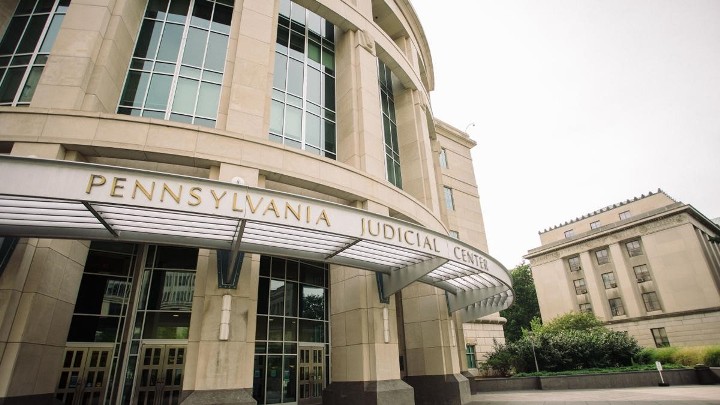 In 2025, Democrats cemented their control of the PA Supreme Court for years to come.
In 2025, Democrats cemented their control of the PA Supreme Court for years to come.
Pennsylvania voters had the opportunity to send those judges packing. Instead, all three judges who were up for retention were overwhelmingly returned (by nearly 25-point margins) to the court for another 10-year term. The PA Democrat Supreme Court thus maintains its 5-2 majority, and one of the two Republicans on the court barely qualifies as such; there is only one true Republican out of seven judges on the PA Court.
In Georgia, which like PA is hardly a solid "blue" state (yet), Democrats scored shocking upsets in two statewide races for the unimportant-sounding office of Public Service Commissioner. Republican incumbents in Districts 2 and 3 were up for re-election, and both got stomped by 25 points with over 1.5 million votes cast in each race.
Pundits on the right have told us in the past that special election losses in tiny state House districts in which not even 3,000 votes were cast were actually of vital importance as far as the GOP "learning lessons" from the defeat. Would they now say we should ignore or deliberately misinterpret election outcomes (not just the ones from Georgia and Pennsylvania) in which millions of votes were cast?
"Unimportant". . . "Not a big deal":
Virginia, like some other solid "blue" states, is considering congressional re-redistricting. Virginia Democrats, soon to be in complete control of state government, would like to imitate California and disenfranchise Republicans via extreme gerrymandering. The results from last Tuesday surely embolden those Democrats. A small minority of New York City voters just elected a radical alien socialist as mayor. Tell the good people of California, Virginia and New York City that these results are "not a big deal".
But the tiny, fragile twig that GOP pundits are seriously attempting to hang their hats on is this one:
These results mean nothing for the future because "things change", "twelve months is an eternity in politics", blah blah blah.
Platitudes, wishful thinking and other drivel are a poor substitute for actual analysis. On this website, we look at data rather than "feels". With the results from 2025 being so uncannily similar to the ones from 2017, it would be idiotic not to examine the results from 2018 and see how they might be pertinent to the upcoming 2026 midterms even if those midterms are "an eternity" away at this moment.
The similarity of 2017 to 2025 is parallel to the relationship between 2016 and 2024. In 2016 Donald Trump won the presidency with 304 electoral votes and took 30 states. He won 45.9% of the popular vote. In 2024 Trump won the presidency again, this time with 312 electoral votes and 31 states (adding Nevada). He received 49.7% of the popular vote, the improvement coming not at the expense of his Democrat opponent but from the deterioration of third-party candidates, whose vote share was 4% less in 2024 than it had been in 2016. Kamala Harris actually took a greater percentage of the popular vote (48.2%) than Hillary Clinton had (48.0%).
The parallel doesn't quite carry over to the House, where Republicans were in much better shape after 2016 than they are after 2024 (a net loss of 21 seats). But that's mainly because of what happened in 2018 -- which is the whole point here -- with the GOP losing many seats. Those losses were only partially offset in 2020 and 2022. After 2016 Republicans controlled the Senate by 52-48. After 2024 they now have a 53-47 advantage. That's pretty similar.
Having compared 2024 to 2016, let's now shift one year and consider 2025 vs. 2017. Because 2021 was a significant factor in the false optimism which accompanied future elections in New Jersey and Virginia, we will show data for that year as well.
2017:
- NJ Governor: D+14.1%, 2.15 million total votes
- NJ Senate: D+1 seat
- NJ Assembly: D+2 seats
- VA Governor: D+8.9%, 2.61 million total votes
- VA Lt. Governor: D+5.5%
- VA Attorney General: D+6.7%
- VA Senate: no scheduled elections in 2017
- VA House of Delegates: D+15 seats
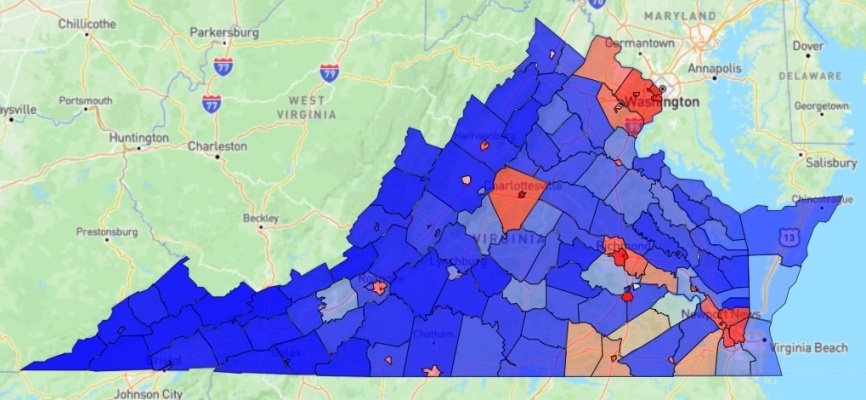 Happier days: 2021 gubernatorial election results in Virginia
Happier days: 2021 gubernatorial election results in Virginia
2021:
- NJ Governor: D+3.2%, 2.61 million total votes
- NJ Senate: R+1
- NJ House: R+6, resulting in more seats for the GOP in the NJ Assembly than anytime since 2003
- VA Governor: R+2.0%, 3.29 million total votes
- VA Lt. Governor: R+1.5%
- VA Attorney General: R+0.8%
- VA Senate: no change
- VA House of Delegates: R+7 seats, retaking control
Adding to the false hope in NJ was Trump losing by "only" 5.9% in 2024 and Curtis Bashaw losing by only 9.7% for the Senate. Also there was a voter registration shift to the right, a net change of 100K between 2022 and 2024, but the Rats were still up 900K (13.5%). In 2025 things improved, with the GOP being down 855K and 12.9%. Whoopee. As far as the 2025 elections in New Jersey were concerned, that wasn't false hope -- that was no hope. Turnout helped Republicans overcome some of their disadvantages in NJ in 2021 (registration deficit and state-level gerrymander) but things would return to normal in 2025 despite the indications from some occasionally cheery -- but sadly inaccurate -- pre-election polls.
In Virginia there was an actual basis for hope after 2021 -- for a little while. There are no partisan voter registration stats to go by, however the election results were so encouraging that Republicans were expecting further gains in 2023 and 2024. In 2023 they failed to pick up the one state Senate seat they needed to get to 20-20 (GOP Lt. Governor would break the tie), and they lost 3 seats in the state House of Delegates, which was the exact number required to lose the House, giving Democrats full control of the state legislature and derailing any agenda GOP Governor Glenn Youngkin may have had.
In 2024 Trump reduced his deficit from 10.1% to 5.7%, but his margin of defeat (260,000 votes) was still the second-worst of any GOP candidate in Virginia history, second only to Trump in 2020. Even in percentage terms it was the worst (aside from 2020) of any GOP nominee since Goldwater in '64. False hope extended to the 2024 senatorial campaign of Republican Hung Cao, whose 2022 showing as a House candidate in CD-10 was considered to be impressive. He lost by merely 6.5% that year in a district which was designed to give the Democrat a 10-12 point win. Whoopee again. Many delusionals thought that Cao could keep it close against Timmy Kaine in 2024, but few polls ever had him within single digits. Cao "overachieved" again. He only lost by 9 points.
There was no false hope regarding GOP chances in Virginia in 2025; there was no hope at all aside from perhaps the Attorney General race. Polls showed a tossup but it turned out that a majority of Virginia voters agreed with the Democrat candidate on the pertinent topic of slaughtering Republicans and their children.
2025:
- NJ Governor: D+14.1%, 3.23 million total votes so far
- NJ Senate: no scheduled elections in 2025
- NJ Assembly: D+3 seats at least, giving Democrats their highest total since 1973
- VA Governor: D+14.8%, 3.38 million total votes so far
- VA Lt. Governor: D+11.1%
- VA Attorney General: D+6.2%
- VA Senate: no scheduled elections in 2025
- VA House of Delegates: D+13 seats (all of them tossup districts, only 1 of which was an open seat)
Republicans can be thankful for the lack of state Senate contests in NJ and VA in November, 2025; they couldn't lose more seats there if there weren't any elections.
2025 New Jersey gubernatorial results by region:
The above results for the 2025 Governor election are of course still unofficial (data as of 11/10) but are at least 95% complete in most counties. We defined the regions of New Jersey here: November 2025 Gubernatorial Elections -- New Jersey & Virginia.
The Republican percentage of the vote collapsed to pre-2021 levels in all regions, even if not quite (in some areas) as bad as the GOP percentages from 2017 . Only in the Central Coast area did Jack Ciattarelli compare favorably at all to his results from 2021. In every other region of the state he finished well behind not only his surprisingly competitive 2021 performance but also behind Trump's mediocre showing in 2024. GOP results in the critical (and supposedly right-trending) northern part of New Jersey were especially disappointing. South Jersey was also a disaster for Ciattarelli. He had come barely one point away from winning that region in 2021 but lost it by a whopping 15 points last week. As we predicted, turnout in the ghetto areas of New Jersey returned to normal from the 2021 dropoff. That certainly wasn't good news for the Republican, but his problems were hardly confined to the worst areas of the state. Also, slightly-improving voter registration figures apparently aren't a guarantee of electoral success -- especially when those voters decline to participate.
 Artist's conception of the GOP's 2018 election results
Artist's conception of the GOP's 2018 election results
Back to 2018:
A preview of the upcoming Republican disaster came one month before 2018 got underway, when Judge Roy Moore lost the special U.S. Senate election in deep "red" Alabama. Senator Jeff Sessions had resigned the seat early in 2017 to become Trump's first Attorney General, and Luther Strange was appointed as Sessions' replacement. An acrimonious 3-way Republican primary occurred, in which congressman Mo Brooks was relegated to third place due to demonstrating insufficient fealty to President Trump. Moore and Strange slugged it out in the runoff with Moore advancing to face unknown liberal Democrat trial lawyer Doug Jones.
Moore, a controversial figure to begin with due to his conservative views, was falsely accused of sexual indiscretions during the 2017 campaign. Five years later, well after it mattered electorally, Moore won his defamation lawsuit against a Democrat PAC. Five days before the December, 2017 election the Democrats ousted their own sexual predator, Al Franken, from the Senate (knowing he would be replaced by another Democrat, without an election being held) in order to try to obtain "credibility" for their attacks on Judge Moore. Mo(o)re importantly, they outspent the GOP nominee in Alabama by a factor of over 4:1. Jones won by 1.7% and was a reliably liberal senator for three years before his inevitable defeat in 2020 by Republican Tommy Tuberville in a 60%-40% landslide as Alabama returned to normal.
An ongoing story throughout 2018 was the number of Republican incumbents in the House of Representatives who suddenly decided that they would not seek re-election in November. There were 23 Republicans who declined to run again for any office, and 11 other House Republicans who chose to run for a different office. Many of these 34, such as former House Speaker Paul Ryan, were anti-Trump moderates or liberals in marginal districts who were content with the prospect of potentially being replaced by Democrats.
When trying to explain the debacle which resulted that November, with the GOP losing 40 House seats, the voluntary exodus was a convenient excuse albeit a false or at least incomplete one. Of the 34 Republicans who walked away in 2018, only 10 of them were replaced by Democrats. That's a considerable number, but a far cry from 40.
The far bigger reason for the Republican party demise was the 30 incumbents who ran for re-election and lost. Seven of the total of 40 GOP losses occurred in California, which had just legalized a new form of Democrat electoral chicanery known as "ballot harvesting". That tactic allows ballots to be collected and counted for weeks after election day. Of the 7 Republican seats which evaporated in CA, at least 5 of them required "extra time" for the Democrat to eventually prevail.
In 2018 the Real Clear Politics generic congressional polling final averages were GOP 44.9%, Democrat 53.3%. That polling could hardly have been more accurate -- after all the ballots were finally counted, the House vote share was GOP 44.8% (was 49.1% in 2016), Democrat 53.4% (was 48.0% in 2016). In case you're wondering about 2026 at this point, the current RCP congressional polling averages are GOP 42.0%, Democrats 46.1%. There are still lots of undecideds 12 months out from the election, but that 42.0% mark is abysmal. The whistlers past the graveyard now have another data point to ignore if they intend to remain adamant that 2026 can't possibly be as bad as 2018 was.
 Senate results from 2018
Senate results from 2018
The House went up in flames but Election Night 2018 was a good one for Republicans in the Senate. Good, but not great. The 2017 GOP defeat in Alabama had left the Republicans with a narrow 51-49 majority. In 2018 they picked up 4 Senate seats (FL, IN, MO, ND) but also lost a pair of seats which they had previously held (AZ, NV) for a net +2. For a little while there also seemed a possibility of the GOP losing Thad Cochran's seat in Mississippi.
The two defeats combined with their fumble of two other anticipated pickups (MT, WV) to render the overall Senate outcome as a significant disappointment for Republicans. There were unrealistic prospects of seizing other Senate seats (MI, OH) as well, leading some dreamers to anticipate up to an 8-seat gain. Viewed in that light, +2 tasted rather bitter indeed and Democrats were relieved that it hadn't been worse.
Somewhat lost in the mourning over the House catastrophe and the missed Senate opportunities were major Republican losses at the state level in 2018. Not only did the GOP suffer a loss of 7 governorships (IL, KS, ME, MI, NM, NV, WI) but they were decimated in state legislatures as well. Republicans went a net minus-66 in state Senate seats that year (losing control in CO, ME, NH & WA), and minus-251 in state Houses (losing control in MN and NH).
If 2026 turns out to be a 2018-type bloodbath, don't discount the impact further down the ballot.
Here, at last, is how the playing field stands as we head into 2026:
Before we look at the prospects for the House in 2026, let's quantify what happened in 2018. In 2018 there were 80 districts (out of 435) across the nation which we would classify as marginal -- being in the range of D+5 to R+5. Those 80 are worth examining because they were the districts most likely to change hands. During any kind of "wave" election, as we saw in 2018, obviously more of them will change hands. Districts which are outside the marginal range are normally considered safe unless there is a wave of unusual intensity or there are other circumstances which make an incumbent vulnerable despite the lean of his district.
Some facts about those 80 marginal districts in 2018:
- 27 favored Democrats, 10 were rated as completely even, and 43 were Republican-leaning
- 23 districts had a Democrat incumbent who ran again and won
- 16 districts had a Republican incumbent who ran again and won
- 5 districts had a Democrat incumbent who did not run again -- Rats held all 5
- 10 open Republican seats were won by Democrats
- 1 Republican was able to hold an open GOP seat (Paul Ryan's old district, WI-1)
- 2 Republicans won open Democrat seats, both of which were in Minnesota
- 23 Republican incumbents were defeated
Additionally, Republicans lost 8 House seats which were not in the marginal range and were assumed to be at least moderately safe. Six of those 8 districts saw GOP incumbents bite the dust; only 2 were open seats (one more dagger in the feeble "we lawst just coz of all the re-tyre-mints!" argument).
The above data illustrates the impact of the 2018 "blue" wave in the House. Even though the 80 marginal districts tilted slightly to the right on average, Republicans still managed to lose 61 of the 80. And on top of that the 8 others which were supposed to be safe-ish. That's what a massacre looks like, so you'll recognize it if you see one again in 2026.
As noted, the "marginal playing field" was tilted towards the Republicans in 2018. If the parties had won every tossup district in which they were favored and then split the 10 even districts, Republicans won have won 53 out of those 80 districts instead of just 19 of 80, a difference of 34 seats. Give the GOP 34 more House seats in 2018 (they would've had control, 234-201) and suddenly the second half of Trump's first term looks a lot different.
We have looked at all House districts for 2026, factoring in new maps in Texas, Missouri, Ohio, North Carolina and California and we are assuming they are not overturned in court prior to ever being used. Try to look surprised when the partisan Democrat gerrymander in California passes judicial muster but Republican maps elsewhere do not.
A new Democrat gerrymander was just approved on November 11 by a liberal judge in heavily-Republican Utah, which creates two more marginal districts (not being counted here yet) and very well could cause two Republicans to lose in 2026.
In Utah.
Pending upcoming Democrat gerrymanders which are still on the drawing board in states like Virginia, Maryland, Illinois and Colorado, and pending the much-anticipated Supreme Court ruling which may remove the requirement for certain states to create anti-White districts, here is how the House battleground is taking shape for 2026:
There are currently 91 House districts which fall into the D+5 to R+5 range according to our ratings. We count 41 of those districts as having GOP incumbents and 41 with Democrat incumbents. The remaining 9 districts have no incumbent running, and that number will increase over the next few months. Including currently open seats, Republicans must defend 45 districts and Democrats 46. That's about as even a breakdown as can be.
The likely effects of the ongoing redistricting currently are:
- California: + 4 safe Democrat seats, and there is only 1 marginal seat (Democrat-leaning, that's how they figure +5 in all) in the entire state; it's now held by a Republican. This leaves 47 (!) almost perfectly-safe Democrat seats here, barring any miracles. This is an incredible accomplishment -- screwing Republicans massively while at the same time shoring up every single Rat incumbent who might have been even remotely endangered (e.g. Josh Harder, Adam Gray, Jim Costa, George Whitesides, Derek Tran, Dave Min). All six Democrats on that list are breathing much easier as of last Tuesday.
- Missouri: +1 safe GOP seat, 1 currently marginal GOP seat becomes slightly safer and just barely exits tossup range.
- North Carolina: Nothing much happened here despite all the wailing from Democrats and high-fiving from Republicans. One marginal Rat-leaning seat becomes a marginal Republican-leaning seat -- but numerous GOP seats in North Carolina (practically every single one of them) are marginal too or very close to that threshold, so if there is ever a "blue wave". . . look out.
- Ohio: No substantial changes to any district, much to the disappointment of Republicans. GOP cowards (fearing some black-robed tyrant, perhaps?) created a new map which doesn't ensure their party any gains at all. They can still pick up 2 or 3 seats anyway, but they could have done that even in 2022 or 2024. The seats were there for the taking, but Republicans blew it both times in CD-1, CD-9 and CD-13.
- Texas: +1 safe Republican seat (yes, only 1), but 4 current Democrat seats are turned into Republican-leaning tossups which the GOP is counting on winning. Assuming no liberal judges say otherwise.
We will cover the Senate prospects for 2026 in a commentary which will shortly follow this one.
Conclusion:
With even more re-redistricting to come, forecasting the outcome of the 2026 U.S. House elections from this far out is just a guessing game. Democrat-controlled states including (but not limited to) Virginia, Maryland, Illinois, Colorado and New York are lining up to disenfranchise Republicans further whether the law permits them to do so at this time or not. Maryland has only one GOP congressman left to be exterminated, but those other states can do much more damage. As we've mentioned, even rock-solid Republican Utah is being forced by a liberal black-robed tyrant to hand over 1 or perhaps even 2 House seats to Democrats (Utah only has 4 altogether).
Some Republican states, perhaps including Florida, Kansas, Nebraska and Indiana can do unto Democrats as Democrats in other states will be doing unto Republicans. But deep-"red" Indiana has already chickened out, Kansas (like Indiana and Missouri) could gain only 1 seat at most -- they all count, so don't scoff too much -- and the GOP can't gain any in Nebraska but can save one which otherwise is about to go down the toilet. Only in Florida is there the potential for a Republican state to get some "California-style" revenge on Democrats, but they could overextend themselves and wind up worse off than where they started (as could easily occur in North Carolina).
The Supreme Court may come to the rescue. Do not hold your breath waiting for that.
A case is pending, brought by a group of White voters in Louisiana who are challenging the racist congressional district map which was demanded by a judge and then used for the 2024 House elections. These disenfranchised voters are suing in an attempt to strike down a map which created a second black-majority district in their state. If the USSC rules in favor of the plaintiffs, professional racists are concerned that all racist Democrat gerrymandering everywhere -- which has been "the law" since at least the early 1990s -- will collapse, thereby eliminating several districts ("19" is the magic number they keep quoting) which are currently held by black Democrats, and those Democrats will all be replaced by White Republicans. As a result, the GOP would firm up its control of the House such that no amount of Democrat gerrymanders in California, Virginia, New York, Illinois or wherever can offset.
This is utter nonsense.
First the case has to actually be decided and the Supreme Court is in no hurry, especially in an election year; it will surely be 2026 before anything happens.
Secondly, the court has to decide the right way. Does anyone really expect there to be 5 votes for doing the right thing here? John Roberts can almost certainly be relied upon to do the wrong thing. Again.
Then there has to be sufficient time to draw new maps in the affected states. And sufficient time for the immediate Democrat lawsuits to be heard. And then those suits must be rejected so the new maps can be implemented. Good luck with all that.
And then things have to work out the way panicky Democrats fear they will. Let's take a look at how the Democrat crystal ball came up with this cockamamie number of "19" seats which they claim are in jeopardy if the USSC disallows racist (i.e. Democrat) gerrymandering in certain southern states. Remember: this stuff was never about race; it was always about partisan politics. Whenever you see the word "black" or "minority" in some racist court ruling, replace that word with "Democrat" if you want to know the truth.
As best we can guess from trying to interpret the feverish nightmares of Democrats, here are the Magic 19:
- Alabama: 2 seats (Republicans should be able to get one back)
- Florida: 4 seats
- Georgia: 5 seats
- Louisiana: 2 seats (one of which is the subject of this court case)
- Mississippi: 1 seat
- Missouri: 2 seats (the GOP will gain one with their new map)
- North Carolina: 2 more seats (after taking NC-1 with the new map)
- South Carolina: 1 seat
So there you have it: 19 House seats which are currently held by black Democrats. If the recently created maps in MO and NC hold up in court, then the GOP will be +2. If the Supreme Court does the right thing and does it promptly, there is a good chance for Republicans to reclaim the two seats (AL-2, LA-6) which black-robed leftist dictators stole from them in 2024. There will be no further developments in Missouri or North Carolina. That leaves Florida and Georgia as the only hopes for inflicting some damage on the Rats. That's much easier said than done.
No matter what lies Democrats are telling about this upcoming court ruling, Republicans will never get anywhere near +19. Doing so would require them to eliminate most or all of the above districts and then create ones which will elect a Republican. And then have those district maps persist despite Democrat lawsuits. That's completely impossible, and Democrats know it. But they never fail to play the race card or the victim card whenever they can, the media swallows that shit up and then regurgitates it for the purpose of bamboozling low-info, low-intelligence voters into voting (D).
The fluctuating re-redistricting landscape is making 2026 a unique year for which to forecast House elections, and that will be true until all maps are final.
Even ignoring that factor for the moment, there is already substantial evidence to conclude that the 2026 results will mirror the results from 2018; conversely, at this time there is zero evidence (wishful thinking is not "evidence") that the 2026 results will not mimic 2018, at least as far as the general direction those results will take. To what degree that will happen is something that can't be anticipated with any precision yet. It's very possible that Congress in 2027-28 will look very much like the one from 2019-20, with Democrats -- no matter how slender their majority -- marching in lockstep in full control of the House ("Peach Mints are back on the menu immediately!") while disunited Republicans perhaps cling to nominal Senate control with a lame duck in the White House.
Tags:
2025
2026 (uh oh)
Virginia
New Jersey
And just about everywhere else
|
|
10/24/2025:
November 2025 Gubernatorial Elections -- New Jersey & Virginia
[RightDataUSA]
|
Although the elections may be tantalizingly close (in truth, they probably won't be that close), the likeliest outcome for the Republicans is. . .
The races have generally (but not consistently) been tightening in both states, especially according to polling organizations which are classified as Republican-leaning by liberal media sources. Some hardcore leftists (e.g. Washington Post) are cheerleading for a Democrat blowout in Virginia, but the ones who attempt to be less transparently liberal forecast the contests as being moderately competitive. Close though the races may be, as things stand now both Jack Ciattarelli (NJ) and Winsome Earle-Sears (VA) appear to be heading for losses. It's up to the good voters of New Jersey and Virginia to get out and vote and prove the pollsters wrong.
We'll start with a look at New Jersey.
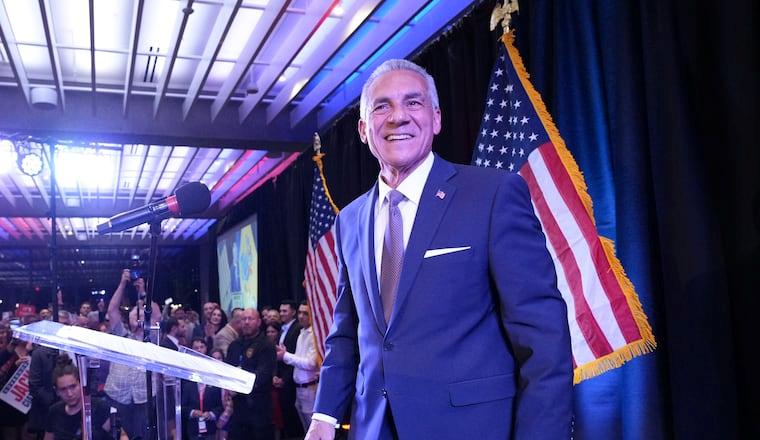 Photo credit: inquirer.com
Photo credit: inquirer.com
Background:
In 2025 Ciattarelli is making his third attempt for Governor of New Jersey. The three-term state legislator ran in 2017 and finished second in the Republican primary to Kim Guadagno, the two-term (2010-2017) Lt. Gov. under Governor Tubba Goo.
In 2021 Ciatterelli came closer than expected to an upset victory after starting 15 to 20 points down in early general election polls. Even polls taken in late October (by Democrat-college groups such as Emerson, Rutgers, Farleigh Dickinson & Monmouth) anticipated incumbent Democrat Phil Murphy being victorious by 6 to 10 points. Only the Trafalgar Group (R) came close to getting it right, predicting a 4-point loss for the challenger; Ciattarelli lost by 84,000 votes (3.2%).
Murphy was first elected in 2017 by vastly outspending Republican nominee Guadagno, as well as by capitalizing on the massive unpopularity of outgoing Republican Governor Chris Christie, to whom Guadagno was constantly linked. That election result maintained New Jersey's habit of alternating parties every 8 years in gubernatorial elections, a pattern which has held since 1993 when ultra-liberal Republican Christine Todd Whitman denied Democrat Jim "Flimflam" Florio a second term by eking out a surprising 1-point victory. Florio later claimed that he was "one of the first victims of modern right-wing talk radio", LOL. Democrats appear likely to break that alternating pattern in 2025.
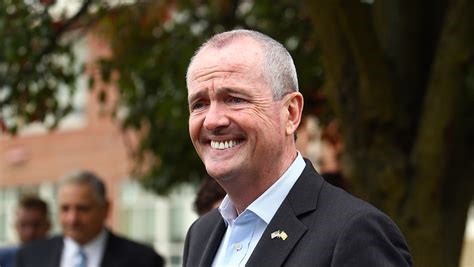 Photo credit: app.com
Photo credit: app.com
The 2021 election was mainly a referendum on Murphy's first term, with Ciatterelli being regarded as sufficiently bland and moderate to avoid alienating potential crossover Democrat voters which any Jersey Republican requires in order to have a chance of winning a statewide election. Murphy is a huge supporter of the illegal importation of new Democrat voters from foreign countries, and he designated New Jersey as a sanctuary state. He also took several steps to hinder the deportation of illegals, such as not permitting law enforcement to ask about immigration status. By 2021 many New Jersey voters had grown weary of the invasion and their disaffection hurt Murphy's re-election chances. Nor were the voters pleased with the numerous tax increases which were passed by the overwhelmingly Democrat NJ legislature.
Unlike 2017, Republicans were able to compete on almost equal financial footing in 2021 in the expensive gubernatorial election. The same applies in 2025, though as we head into the final days of the race the Democrat has substantially more cash on hand, and therefore will likely be more visible in the media than Ciatterelli (nevermind the media bias advantage the Democrat already holds for free).
Ciattarelli won 6 of New Jersey's 12 congressional districts in 2021 -- including the one represented by 2025 Democrat nominee Mikie Sherrill. Sherrill is currently in her fourth term in the House, and is a member in good standing of the far-left wing of her party. She was first elected in the anti-Trump year of 2018 in what at the time was a tossup district (NJ-11) centered on upscale, suburban Morris County.
Until 2018 Morris County had been forever represented in Congress by liberal Republicans such as Rodney Frelinghuysen. Like several other squishy Republicans in the House, the staunchly anti-Trump Frelinghuysen picked 2018 to retire. The 72-year-old, 12-term representative was not comfortable being "forced" to toe the party line and support a president whom he despised. Frelinghuysen abandoned his House seat, hoping (or knowing) that he would be replaced by a Democrat who would help the new Democrat majority thwart Trump's legislative agenda and begin Trump's congressional persecution. Sherrill filled that role nicely.
Morris County seems to have recently begun a journey away from the left and back towards the center, voting for Trump in 2024 after giving Joe Biden a 4.2% victory in 2020. Morris is reliably Republican in other statewide elections too (Murphy lost there twice and it wasn't particularly close), even selecting hapless Curtis Bashaw over Andy Kim in the 2024 Senate race. In 2022 Democrat gerrymanderers added a larger portion of ghetto Essex County to the Eleventh District, taking it from being a complete tossup to favoring Democrats by 5 points. Republicans face an uphill battle to win NJ-11 in 2026 from either Sherrill or whoever her special-election replacement is if Sherrill becomes Governor as expected.
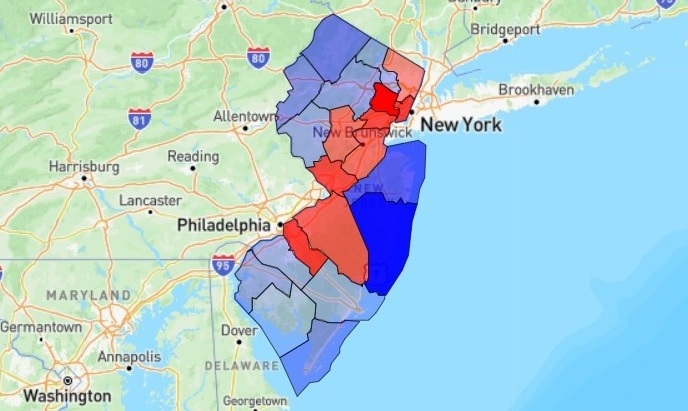 2024 presidential election results in New Jersey
2024 presidential election results in New Jersey
Geography:
We have divided New Jersey into the six geographical regions listed below, shown with the counties which correspond to those regions:
- South Jersey: Atlantic, Burlington, Camden, Cape May, Cumberland, Gloucester, Salem
- Central Jersey: Mercer, Middlesex, Somerset
- West Jersey: Hunterdon, Morris, Sussex, Warren
- Central Coast: Monmouth, Ocean
- Urbanized North: Bergen, Passaic
- Ghetto Jersey: Essex, Hudson, Union
West Jersey and the Central Coast are the most Republican areas of the state; together they normally cast 28-30% of the statewide vote.
Unsurprisingly, Ghetto Jersey is by far the most Democrat area of the state; it delivers about 18% of the statewide vote and gives a tremendous margin to whatever Rat is running. Of the three recent elections (2017 Governor, 2021 Governor, 2024 President) which we will be focusing on for the purpose of establishing trends, Trump did the best of any GOP candidate in this region, but still received only 32% of the vote.
Central Jersey (epitomized by places such as Trenton, New Brunswick and Princeton) is consistent in its anti-Republicanism and provides approximately a 16-point margin for the Democrat while accounting for 16-17% of the statewide vote.
South Jersey is the largest region both in land area and in number of votes. It accounts for about 22% of New Jersey's votes and can be marginal. It was heavily against Ciatarelli in 2017 but he nearly won there in 2021 before the region swung back a few points to the left against Trump in 2024.
The Urbanized North is the most marginal region now and is the one which is moving most noticeably to the right although still slightly favoring the left. It is this area which GOP analysts see as the key if they are to win in New Jersey. Republicans have recently been competitive in the 9th congressional district which lies almost entirely in this region, despite being grossly outspent and despite a Democrat gerrymander which deliberately omits the better parts of Passaic County. Ciattarelli improved here by 12 points (net) between 2017 and 2021 and Donald Trump nearly won this region, losing by only 1.5% in 2024.
The next table shows the margin of victory (or defeat, if the number is negative) by region for the GOP candidate in these three elections:
Finally, the number of votes cast by region, along with the region's percentage of the statewide vote:
One of the keys to the near-upset in the 2021 gubernatorial election was the fact that many ghetto voters (Democrats, obviously) chose to sit that one out rather than vote for Murphy. The share of the statewide vote from Essex, Hudson and Union counties dropped nearly 2 percent. Those voters were re-energized in 2024 to vote against Trump and the statewide vote share from the 3 ghetto counties rebounded to where it had been in 2017.
Anti-Murphy apathy will not be on the ballot in a couple of weeks, but anti-Trump motivation will be -- here and everywhere else where an election is taking place (at least in "blue" areas). As was the case in the disastrous election years of 2017-18, Trump is always "on the ballot" as far as the left is concerned. Turnout in these off-year races isn't quite as meager as it is for little-publicized special elections which often take place at odd times (i.e. not November), but turnout still does not approach presidential-year levels. That means motivation, organization and money are the key factors to generating turnout; Democrats are normally substantially ahead in all 3 of those factors, and it shows.
Voter Registration:
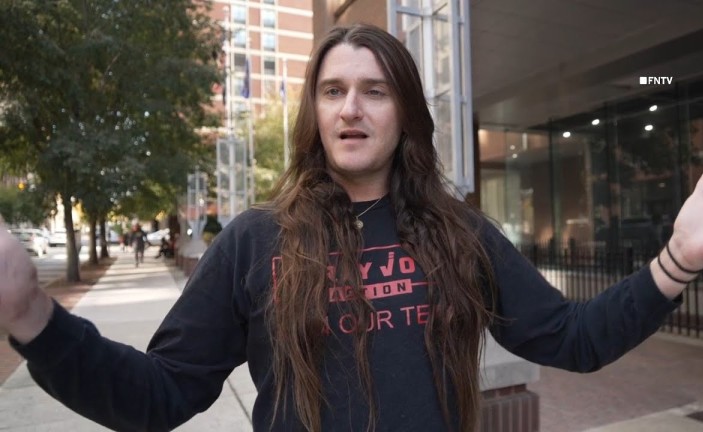 Photo credit: redlineheadlines.com
Photo credit: redlineheadlines.com
Scott Presler and his organization have worked diligently over the past couple of years to increase Republican voter registration counts in certain states. Presler focused on Pennsylvania during 2024 and has been given inordinate credit for the GOP victories which occurred there -- Trump's win along with that of Senator Dave McCormick, and the important pickup of two House seats (CD-7 and CD-8) in Eastern PA.
While it is true that the Democrat registration advantage in PA was reduced to 3.1% from 5.6% during 2024 (a net GOP gain of 165,000 registrations in 12 months), the trend in PA has been significantly in the R direction for over 15 years now. Between November of 2008 and November of 2023 the GOP added 210,616 voters in the Keystone State while Democrats diminished by 579,285, a net change of 789,901 in the positive direction for Republicans.
Pennsylvania has apparently "cleaned up" its voter rolls in 2025, with both parties seeing a reduction in registrations:
2024:
- 3,710,290 R (40.5%)
- 3,991,381 D (43.6%)
- 1,460,307 I (15.9%)
2025:
- 3,642,630 R (40.9%)
- 3,811,262 D (42.8%)
- 1,448,470 I (16.3%)
The last time Republicans achieved a 40.9% or greater share of voter registrations in a November election in PA was 2003.
This November, Pennsylvania voters will have the chance to oust 3 Democrat members of the state Supreme Court. Those members, along with their liberal colleagues, are responsible for the hyper-partisan gerrymander which has affected not only congressional districts in Pennsylvania but state legislative districts as well. These gerrymanders cost Republicans 4 U.S. House seats (and almost 2 others) from 2019-2024 and cost 12 state House seats -- exactly enough to give Democrats control. Republicans have a chance to eliminate some of the justices who caused those events to happen, and perhaps gain a majority on the PA Supreme Court in the process.
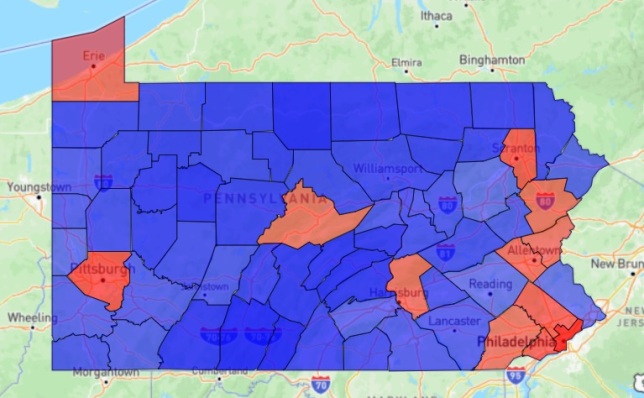 2024 PA voter registration, by county
2024 PA voter registration, by county
After 2024, Presler and his vote registrars moved east to New Jersey in an attempt to turn that state "red". As in PA, trends in New Jersey were already favoring Republicans, although these trends have not manifested themselves in any victories. Trump's loss by 5.9% here in 2024 was actually the best showing for a Republican candidate since George Bush lost by only 2.4% in the 3-way election of 1992. Prior to 1992, the GOP won 6 presidential elections in a row in New Jersey before the state's demographics began to head rapidly south.
Recent results have been no better down the ballot, with Chris Christie the only Republican to win statewide since Christie Whitman in 1997; the GOP has not elected a U.S. senator from the Garden State since ultra-liberal Clifford Case in 1972, and the U.S. House districts have been gerrymandered to an amount which limits Republicans to just 3 districts out of 12 (and at least one of those GOP districts, CD-7, is very marginal). Those factors notwithstanding, Trump did a little better statewide than expected in 2024, Jack Ciattarelli almost pulled off a major upset in the most recent gubernatorial election, and there appears to be reason for some optimism on the Republican side going forward.
The trend is also apparent in the New Jersey voter registration figures, to a minor degree.
November 2023:
- R: 1,541,158 (23.7%)
- D: 2,504,294 (38.6%)
November 2024:
- R: 1,628,633 (24.2%)
- D: 2,534,932 (37.7%)
October 2025:
- R: 1,670,297 (25.3%)
- D: 2,525,346 (38.2%)
It is worth noting that a sizable number of New Jersey voters are neither Republicans nor Democrats. If the polls are correct, independents are favoring the Democrat by a substantial amount in the 2025 gubernatorial race.
Going back to 2008, Republicans have added 614,894 voters in New Jersey and Democrats have added 742,790. However the recent data is more affirmative with the GOP registering large gains during 2024 and then almost as many again in 2025. Democrat registration has been stagnant during the past two years. Will the "Presler bump" in 2025 be enough to put Ciattarelli over the top on November 4? Current polling suggests it will not. He may be fortunate to lose by only as much as he did in 2021.
Conclusion:
It is being reported, even by far-left sources, that all is not well in Camp Sherrill despite her clear lead in nearly every poll. There has also been fear that black voters and other minorities will turn out at less than their usual rate, as occurred in 2021 (spoiler alert: that isn't going to happen again in 2025). The Naval Academy cheating scandal in which both Sherrill and her husband are allegedly involved isn't resonating at all with voters and (shockingly!) isn't being covered in the so-called mainstream media.
Even lefties concede that Sherrill does not generate much enthusiasm, but the fact that New Jersey has nearly 1 million more Democrats than Republicans makes "enthusiasm" a rather moot point in the face of that landslide registration advantage. Furthermore, while comparatively few Democrat and independent voters may be excited about voting for Mikie Sherrill, they are probably quite motivated to vote against Donald Trump clone Jack Ciattarelli. Of course Ciattarelli is no such thing, but hatred is a powerful motivator for Democrats and no facts are going to be allowed to impede that hatred.
Final prediction: Sherrill prevails by 2 to 4 points, with a decent potential for an even greater margin (say, 4-6 points). We'd positively adore being wrong about this outcome, but even if she only wins by 1 then we're still not quite wrong enough.
Virginia:
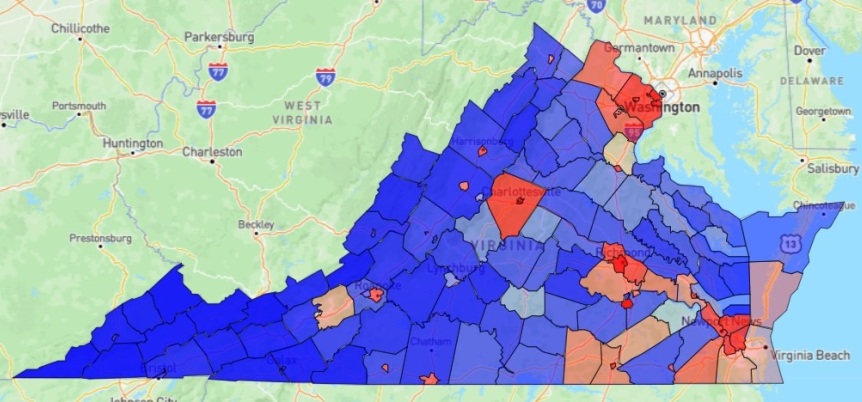 2024 presidential election result in Virginia
2024 presidential election result in Virginia
Background:
Although Trump lost the Commonwealth of Virginia in 2024, his margin of defeat (5.7%) was a distinct improvement over 2020 when he lost by over 10 percent; the 2024 outcome was in line with other recent presidential elections in Virginia. There was false optimism in the 2024 U.S. Senate race, where many wishful thinkers believed that Hung Cao would defy the polls and score a major upset over incumbent radical leftist Timmy Kaine, or at least make it a close call. Cao did neither of those things, losing by 9 points which was just a slight tick better than the polls predicted.
Trump's sizable step in the right direction, along with the surprise victory by Republican Glenn Youngkin for Governor in 2021, helps to create the illusion that Virginia is a "purple" state where Republicans have almost as good a chance at winning as Democrats do. In reality, Virginia is slipping behind the rest of the country and becoming "bluer" by the day. Relative to the nationwide percentage of the Republican presidential vote, Trump's 4-point underachievement in VA in 2024 was the worst showing here for a GOP candidate since the 1940's when Virginia was solidly Democrat across the entire ticket. Although Virginia does not register voters by party, recent estimates of party affiliation indicate that Democrats have nearly a 2:1 advantage over Republicans. That's not very purple-ish.
Speaking of Governor Youngkin, his win in 2021 was primarily the result of the stars and planets aligning in his favor, and it is now abundantly clear that Youngkin's electoral success (and that of his party, which gained 7 seats and took control of the state House that year) was a temporary phenomenon.
Youngkin benefited from several factors, which have some parallel to Donald Trump's surprise victory in 2016, and those factors may have also helped Republicans in races down the ballot in Virginia in 2021:
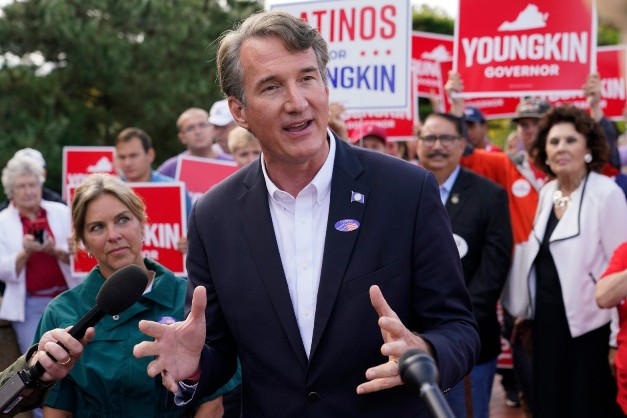 Photo credit: washingtonmonthly.com
Photo credit: washingtonmonthly.com
- Youngkin, like Trump in '16, was a political outsider and not a career politician, and both were fortunate to be able to run against the single most repugnant and unlikeable Democrat available at the time (Terry McAuliffe, Hillary Clinton). Former Governor and Clinton crony McAuliffe was a godsend for Youngkin. McAuliffe's abrasive personality and his far-left political positions proved to be quite helpful to the moderate Republican candidate. Furthermore, the Republican was able to compete financially against the Democrat's massive fundraising advantages by contributing significantly to his own campaign. Youngkin distanced himself from Trump (while McAuliffe was not able to distance himself from Joe Biden) enough to keep moderate and independent voters from bolting to the left.
The 2021 Republican nominee was aided in great measure by voter revulsion against local school boards (notably in Loudoun County) which were defying parents -- and common sense -- by welcoming the presence of boys in girls' bathrooms and by continually "overstepping parental rights during the pandemic". When a male student raped a female student in a Loudoun County school bathroom in 2021, the incident and the school's mishandling of it rightfully became a national scandal -- at least in the "right wing" media. The liberal media downplayed and/or ignored the story after an initial cursory report, with a majority of voters in upscale, liberal Loudoun County probably being totally unaware of what had occurred right in their own backyard. But many good voters in the rest of the state were aware of this atrocity, and their logical reaction to it helped Youngkin considerably.
- Virginia is not exactly known for the cleanliness of its elections in recent years, but Youngkin was perhaps not taken as seriously by Democrats as he should have been even though he was close or even slightly led McAuliffe in polls which were taken in the closing weeks of the race. Trump also was not given a serious chance to win in 2016, and liberal pollsters right up to election day helped the Democrats maintain their (false) overconfidence; Democrats and Deep Staters of both parties did prepare for the eventuality of Trump's election by fabricating the "Steele Dossier" and all the phony "Russia, Russia, Russia" crap to attempt to hamstring him after the fact, but they apparently didn't put as much -- let's call it "extra effort" -- as usual into achieving their desired electoral outcome in the first place.
Underestimating the amount of voter support which both Trump and Youngkin actually had, the Democrats apparently did not feel the need to ensure victories by their usual methods (cough, cough). Trump was able to achieve narrow victories in critical states such as Pennsylvania (by 0.7%), Michigan (0.2%), Wisconsin (0.7%) and Florida (1.2%) and thus win the electoral vote despite losing the popular vote by 2.1%. Youngkin improved his party's showing from 2017 in several areas of the state, winning major portions of the Tidewater and Greater Richmond areas, and vastly reducing the deficit in NOVA -- even in Loudoun County, but still lost by 11 points there.
In the aftermath of that glorious 2021 outcome it was reported that one of the main reasons for it was the "Virginia Project", a Republican effort to increase election integrity (something Democrats always oppose) by, for one thing, recruiting poll watchers for as many precincts as possible. With 36% of the votes in the 2021 Virginia gubernatorial election being cast early or absentee, the impact of GOP poll watchers was somewhat muted unless they were present when the envelopes were being opened and the ballots counted; their presence on election day was still helpful, though.
With it seeming to work so well in Virginia that year, the Virginia Project (we were told) would serve as a model for helping ensure the honesty of future elections, and would be expanded to states beyond Virginia. Looking at many important outcomes from 2022 onward, the proponents of the Virginia Project either never implemented their model or it didn't function as well as expected. In any event, there's much more to the concept of election integrity than poll watchers can accomplish.
- Even with all of those advantages, both Trump and Youngkin won rather unconvincingly. The mistakes which national Democrats made in 2016 at the presidential level were "rectified" in 2020; the mistakes which Virginia Democrats made in 2021 began to be rectified almost immediately: the 7-seat gain which gave Republicans the Virginia state House starting in 2022 was partially offset in November of 2023 when Democrats added 3 seats and seized control of the House, 51-49; they have held the state Senate throughout Youngkin's term, by a 21-19 margin.
The candidates:
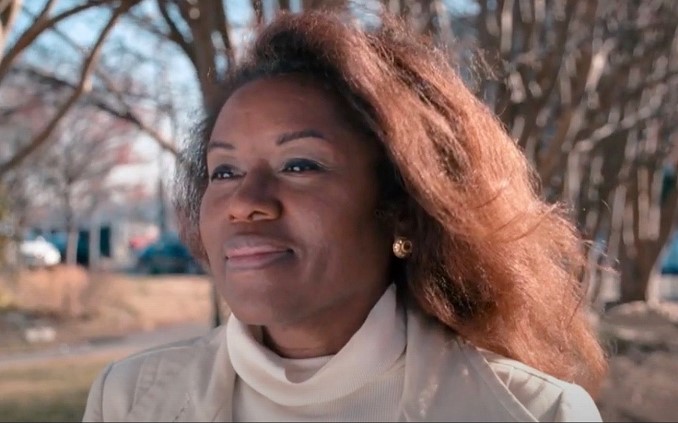 Photo credit: lifenews.com
Photo credit: lifenews.com
GOP nominee Winsome Earle-Sears is an immigrant from Jamaica who arrived in the U.S. at the age of 6. She served in the United States Marine Corps for 4 years in the 1980's and became an American citizen during that time. Her political career commenced in the early 2000's when she won a race for the state House, upsetting a black Democrat who had been in office for two decades. She was the first Republican to win a state House seat in a majority-black district in Virginia since 1865. She later became the state's first female Lieutenant Governor (elected in 2021) and is the first black female to be elected to any statewide office in Virginia.
Although Sears endorsed Donald Trump in 2020 and served as the chairman of a PAC called "Black Americans to Re-elect the President", she broke with Trump in 2022 because she believed that the candidates Trump had endorsed that year were too conservative and therefore unelectable (in fact they weren't elected, but Sears was wrong about the reason for their defeats). At that time Sears declared she would not support Donald Trump's election bid if he were to run in 2024.
Probably for this reason (yeah, "probably"), Trump for a long time refused to support Sears for Governor in 2025, though he belatedly came through with an endorsement earlier this week. That endorsement, however, seemed to focus more on Spanberger being a "disaster" for Virginia than it did on Sears being Trump's choice for the job.
Sears also has the endorsements of Governor Youngkin, state Attorney General Jason Miyares, the entire Virginia Republican congressional delegation, and some congressmen from other states. Sears is pro-life, supports "common sense" tax cuts and government spending cuts, and opposes Democrats' radical pro-crime policies such as "catch and release" and sanctuary cities. She opposes incompetent (but powerfully unionized) teachers and favors school choice and parents' rights. Sears also strongly supports Virginia's "right-to-work" law. These positions stand in stark contrast to that of her allegedly "moderate" Democrat opponent, Abigail Spanberger.
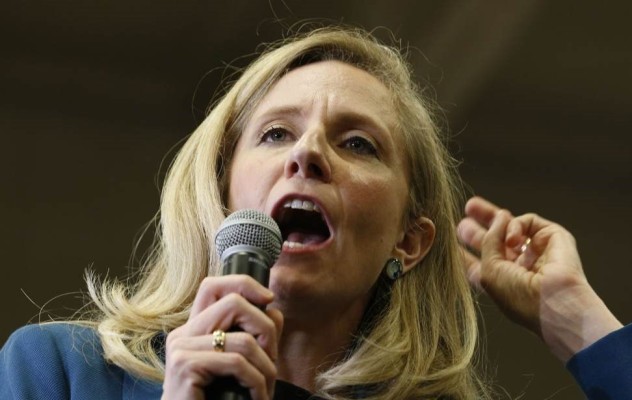 Photo credit: twitchy.com
Photo credit: twitchy.com
Spanberger, a native of New Jersey, went from being a substitute schoolteacher and a postal inspector to (as of 2006) being a spy for the Central Intelligence Agency; a rather interesting career change, to say the least. When she first entered politics, Spanberger's CIA resume was sanitized so that it could be declassified and, according to ABC News, the former spook stuck "to carefully scripted lines, approved by the agency, when talking about her work" on the campaign trail.
In 2018 CIAbby was recruited to run against Republican incumbent Dave Brat for a seat in Congress. Brat had irritated many GOP bigwigs by daring to oppose -- and defeat -- golden boy Eric Cantor, a squish who was a member of the GOP leadership (House Majority Leader) when he was shocked by Brat in the 2014 primary. We wrote at length about Brat's situation here, and his parallels to ex-congressman Bob Good. Good, a very solid conservative like Brat, fell out of favor with his party's leadership in 2024, and irritated the biggest bigwig of them all (Donald Trump). Good was defeated in the 2024 primary.
VA-7, the formerly Republican-oriented district in which Brat toppled Cantor and then 4 years later was defeated by Spanberger, was altered to give Democrats a much greater chance of success after 2014. Brat survived in 2016 because the Democrats pretty much gave him a free pass, but in 2018 Spanberger was able to raise and spend over $7 million dollars to purchase that House seat. That was more than double the amount which Brat could raise (or obtain from his indifferent party leadership). The surplus millions which Deep State Abby was able to throw around proved to be critical as she eked out a 1.9% win in the recently-gerrymandered district; her margin of victory came almost exclusively from the new Democrat areas in the Richmond suburbs which were added after 2014.
Democrats spent lavishly while procuring numerous House seats in 2018 and, coincidentally, another new Democrat who was the recipient of an astronomical "investment" that year was New Jersey's Mikie Sherrill who is now her party's gubernatorial nominee in that state.
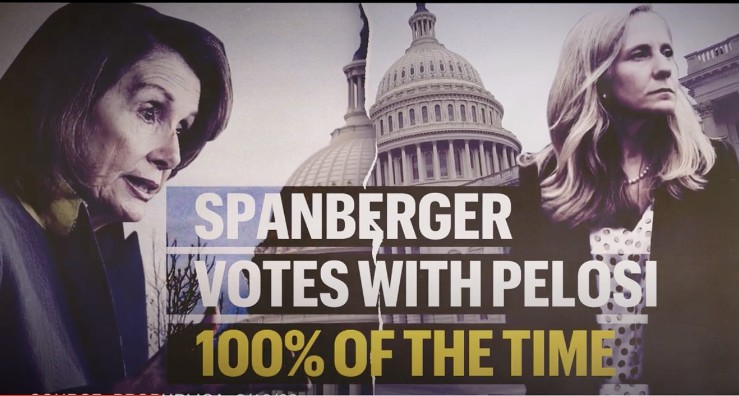 Photo credit: NRCC
Photo credit: NRCC
Republicans picked up 13 House seats in 2020 but Spanberger's wasn't one of them although a serious effort was made. Her district, which had been rated as R+10 prior to the 2016 Democrat gerrymander, was still slightly "red" and Republicans had it high on their list of potential pickups. Spanberger, then as now, occasionally talks like a moderate and did cast a highly publicized (and highly choreographed) vote against Nancy Pelosi for Speaker in January, 2019. Spanberger then spent the remainder of her first term in Congress establishing her liberal bona fides, but was able to conceal that fact from the voters as she reverted back to her faux-moderate persona.
Nick Freitas, a solid conservative, defeated squishy John McGuire (now a congressman from Virginia's Fifth District) in a contentious Republican party primary convention in July of 2020, and won the right to oppose Spanberger in November. As in 2018, the Republican carried all areas of the district aside from the deteriorating Richmond suburbs, but that was not sufficient to prevail district-wide. Or was it?
On the afternoon of the Wednesday following the 2020 election, Freitas had a lead of a little more than 1,300 votes over Spanberger. Then came the discovery of a "flash drive" in Henrico County by the husband of a Democrat operative, and that flash drive miraculously contained over 14,000 as yet uncounted votes in the 7th District. Just as miraculously, Spanberger happened to receive a tremendous percentage (64%) of those flash votes. The Democrats later found even more votes for CIAbby, making sure that her final margin was outside the range which would require an automatic recount. In 2022, Spanberger spent over $9 million dollars to successfully retain the 7th District seat; redistricting by that time had moved the district even further left in order to help ensure her another term. Spanberger did not seek re-election in 2024 in order to focus on her gubernatorial run.
Geography:
As we did with New Jersey, we have split Virginia into 6 regions:
- Rural Chesapeake Bay area
- Greater Richmond
- Hampton Roads
- Northern Virginia
- Piedmont / Southside
- Shenandoah Valley / Southwest Virginia
Taking some of these regions together, Virginia can be divided into three pieces of approximately equal electoral weight. Two of the three nearly always favor Democrats.
NOVA is of course the most Democrat-infested area, teeming with people whose livelihoods depend on the federal government taxpayer. If it were a congressional district it would be rated approximately D+17 based on recent results. It is also the most populous region, casting just under one-third of the state's votes in most elections. The large number of votes which must be counted here undoubtedly explains why NOVA is typically the last area of Virginia to report on election night, wink wink.
The portion of the state which is included in the Piedmont / Southside / Shenandoah / SW Virginia regions accounts for just under 30% of the statewide vote and gives Republicans their biggest margins of any region. The statistically insignificant (barely 2% of the vote), lightly populated Chesapeake Bay counties also support Republicans lately, by almost exactly the same percentages as obtained in the Piedmont / Southside areas.
The Greater Richmond and Hampton Roads regions together outnumber NOVA in total voters, though not by a lot. They solidly favor Democrats in most races, and if a Republican is going to win a statewide election he needs to come close to getting 50% here. Youngkin did that in 2021 (he received about 48%) but Ed Gillespie didn't in 2017 nor did Donald Trump or Hung Cao in 2024. The latter 3 GOP candidates mustered only about 42% or 43% there; Youngkin won statewide, the others did not.
Conclusion:
Unlike in North Carolina in 2024, where the unpopularity of one GOP candidate (Mark Robinson) dragged down the entire statewide Republican ticket although some Republicans won anyway, the presence of violent, feral racist Jay Jones as Democrat nominee for Attorney General has had no impact on other Virginia Democrats in 2025; in fact, Jones still retains about a 50-50 chance of winning himself according to left-wing pollsters. So any Jones Effect on the gubernatorial race which would assist Sears can likely be discounted as non-existent.
As of October 15, campaign finance reports showed that CIAbby had raked in $53.8 million and disbursed $48.4 million. The Sears campaign lags far behind, running on about half of what the Democrat has done in both of those categories. There is also a wide disparity between the two candidates in terms of remaining cash-on-hand, with about a 3:1 advantage to Spanberger as we head into the final days of the campaign.
The Lieutenant Governor race and the one for Attorney General will end up closer than the Sears-Spanberger duel, but Republicans are likely to lose at least one of those two downballot tilts, and quite possibly both. There is some chance that they could win both (while still losing for Governor), but that is less likely barring a significant change in fortunes between now and November 4.
The Virginia state Senate has been in Rat hands since they picked up the two seats they needed in 2019. It's been status quo since then, with the Republicans needing one seat to forge a tie and two to take control. With the L.G. probably going Democrat in 2025, one seat isn't going to be enough. The state Senate map for this decade has been gerrymandered to favor Democrats, and under those conditions the GOP is doing well to merely be down 21-19. A similarly gerrymandered state House map also strongly favors Democrats; again, the GOP has done well to even keep it close. The forecast for this November is not sunny for Virginia Republicans at the state legislative level, and they are going to need to overachieve a little more if there is any hope of thwarting the agenda of "Governor Spanberger". Ugh.
Tags:
2025
Governor
New Jersey
Virginia
|
|
5/16/2024:
Mid-May Primary Wrap-Up
[RightDataUSA]
|
 Photo credit: Mike Braun For Indiana
Photo credit: Mike Braun For Indiana
In the state of Indiana on May 7, the Republican primaries all went as expected although one outcome was successfully influenced by a considerable amount of out-of-state money being spent by single-issue groups in order to defeat a certain GOP candidate.
In the high-profile gubernatorial primary, moderate-conservative U.S. Senator Mike Braun easily defeated a collection of viable opponents; these included current Lieutenant Governor Suzanne Crouch, state Commerce Secretary Brad Chambers and businessman Eric Doden. In the weeks before the primary, the liberal media frequently cried about how horribly conservative all of these candidates were, leaving the impression for the good citizens of Indiana that any of them would make a fine Governor. Braun won with 39.5% of the vote in the 6-candidate field, with Crouch coming in a distant second with 21.7%. Braun won every county but three.
Braun's opponent in November is virulent Trump-hater Jennifer McCormick. McCormick was once elected -- as a Republican -- in a fluke in 2016, happily riding the coattails of the President she hates to an upset win over the incumbent Superintendent of Public Instruction in Indiana; the office was then abolished by the state legislature in 2019. McCormick switched parties in 2021 and has become the consummate liberal Democrat, attempting to appeal to voters on the basis of favoring unrestricted abortions, radical environmentalism, and of course more taxpayer money for left-wing teachers' unions. McCormick was unopposed in the Democrat primary. She starts the general election campaign well behind in the polls; she will finish the campaign there too.
Squishy state legislators won GOP primaries in CD-1 and CD-8. CD-1 (Gary, Hammond, Michigan City, most of LaPorte) hardly matters because the incumbent Democrat is easily going to win again in November.
 Photo credit: AIPAC
Photo credit: AIPAC
In CD-8, ex-Congressman John Hostettler was trying to reclaim the seat he lost 18 years ago. Hostettler wasn't exactly a paragon of arch-conservatism during his time in Washington, but he was OK and he'd be better than state Senator Mark Messmer who at one time was a conservative but is now a total squish. Hostettler was branded as "anti-Jewish" and was opposed by the extremely wealthy Israel Lobby (groups such as the "Republican Jewish Coalition" and "United Democracy Project"). Over $2 million of their money went into this single U.S. House primary with the goal of electing the more liberal Republican. Messmer won with nearly 40% of the vote while Hostettler (who was endorsed by Rand Paul and Charlie Kirk) came up just short of 20% in the field of eight. Money talks, and in this contest it absolutely shrieked. One wonders just how much these particular special interest groups are spending to oust anti-Israel Democrats from Congress; there aren't any shortage of those, but these groups seem to be giving them a free pass.
In CD-5, incumbent moderate Victoria Spartz lately hasn't been too bad on issues aside from ones related to Ukraine. She alone in the U.S. House at least has a personal reason to keep funneling billions of dollars of U.S. taxpayer money to that thoroughly corrupt rathole -- she is from the Ukraine. Spartz had initially decided not to run for re-election this year, and was probably lured back out of GOPe fear that a true conservative would win her district. And one would have, too. Spartz narrowly prevailed over conservative state House member Chuck Goodrich by just 6% (39% to 33%). Max Engling came in third, taking 10% of the conservative vote away from Goodrich, more than enough to alter the outcome. There were 6 lesser candidates seeking the nomination as well.
Jim Baird in CD-4 is an elderly RINO joke but Trump bypassed conservative challenger Charles Bookwalter and endorsed the incumbent since Baird was 98% certain to win the primary based on name recognition and a mere 7:1 advantage in money. Nevermind that the actual conservative would have been 98% certain to win in November too seeing as how Democrats don't even bother with this district. Trump rarely, if ever, passes up a safe RINO incumbent, and at least Baird didn't vote for Trump's impeachment (which is probably all that mattered in this case).
The CD-3 seat is open in 2024 because incumbent Jim Banks is running for the Senate; he was unopposed in the primary and will win easily in November, giving Indiana an actual conservative there alongside his moderate-liberal GOP colleague Todd Young. Conservative ex-congressman Marlin Stutzman (last elected in 2014) attempted to reclaim his old seat, and succeeded in this hotly-contested primary. Four different candidates won at least one county in this northeastern Indiana district which includes Fort Wayne. Conservative Tim Smith was the leading challenger to Stutzman, taking 22.6% to the winner's 24.2%. Stutzman had numerous endorsements from current and former congressmen. Moderates Wendy Davis and state Senator Andy Zay came home third and fourth, combining for over 35% of the vote. Grant Bucher was fifth at 10.3% but he actually won two small counties. Stutzman is heavily favored to return to Congress in November after he defeats unknown and unfunded liberal Kiley Adolph, who predictably won the Democrat primary on the basis of being a female who was running against a male.

In Maryland on May 14, liberal women swept the Democrat primaries for open seats in the U.S. Senate and House districts 3 and 6. We've already profiled the Senate contest, and as far as House races only the primary in CD-6 was of any significant interest to Republicans; it's their one slim chance of picking up a Democrat-held House seat in Maryland, where liberals currently occupy 7 of the 8 districts thanks in at least a couple of cases to hyper-partisan Democrat gerrymandering. CD-6 is the most gerrymandered of them all.
On Tuesday in that district, 2022 gubernatorial candidate/sacrificial lamb Dan Cox ran against perennial candidate Neil Parrott in the GOP primary. Both are conservatives. Parrott was victorious by 47% to 30%, and this will be his third consecutive try to take the 6th district. He'll be facing the wife of former congressman John Delaney, an ultra-liberal who won three terms here (2012, 2014, 2016) due solely to the harsh gerrymander implemented by the veto-proof Democrat legislature in 2011.
When the district maps were redrawn that year, CD-6 was shifted a whopping 16 points to the left by adding execrable areas of Montgomery County to the nice counties in the panhandle west of Frederick. The district was moved slightly back towards the center (7 points) in 2021. Still, Trump lost the redistricted area in 2020 by almost 10 points (instead of the 23 points by which he lost in CD-6 as it stood prior to redistricting). As of 2022, Democrats still have a 6.5% edge in voter registrations here, and it appears that "independents" regularly break left too. The Cook PVI for CD-6 claims it's only D+2, which seems like a crock given recent presidential & House election results. Furthermore, Parrott's chances in the general election are hardly enhanced by the sizable financial advantage which the liberal feminist Democrat has here. Given that this open district is not totally a lost cause, the RNC may eventually decide to toss a few dollars in Parrott's direction.
 Photo credit: bacon.house.gov
Photo credit: bacon.house.gov
Nebraska: the state-level GOP organization which, according to surely unbiased media reports, "was taken over by those loyal to former President Donald Trump during a contentious state convention" -- that happened back in 2022 -- decided to oppose (or ignore) all 5 of the Republican incumbents who were running for federal office. This is quite good since pretty much all 5 incumbents are squishes, but unfortunately the tactic proved to be utterly ineffective. For one thing, actions (especially $$$) speak far louder than words, and these were only words; the conservative challengers collectively had about $1.50 to work with here. Also, making the announcement regarding endorsements just moments before the voters had to head to the polls was a great way to make sure that as few people as possible got the message.
Nebraska has two Senate elections this year, one of which was necessitated when Trump-hater Ben Sasse fled to Florida and was replaced by Pete Ricketts, who was appointed by Governor Jim Pillen in January, 2023. The other Senator, Deb Fischer, is also up this year.
There are also 3 incumbents who are running for re-election to the House: Mike Flood in CD-1, Don Bacon in CD-2 and Adrian Smith in CD-3. Here are the lifetime American Conservative Union (ACU) ratings for these guys:
- Senator Pete Ricketts: 66% (1 year)
- Senator Deb Fischer: 81% (11 years)
- Rep. Mike Flood: 72% (2 years)
- Rep. Don Bacon: 64% (7 years)
- Rep. Adrian Smith: 85% (17 years)
The NEGOP made no endorsement in the races involving Fischer and Flood, and they endorsed challengers to Ricketts, Bacon and Smith. All 5 incumbents did face primary opposition -- such as it was.
Fischer won on Tuesday with 80% and Ricketts had 79%. Their challengers, official party support and all, didn't even rise to the "nuisance" level. Flood received 82% in his congressional primary, Smith 74% and Bacon 62%. Don Bacon enjoys his role as a rabidly anti-conservative Republican who helps the Democrats on most important issues, and he richly deserved a challenge. His challenge will come not from some destitute conservative Republican in the primary, but instead from a greasy, well-funded liberal Democrat in the general election. Far-left state Senator Tony Vargas (2023 ACU rating: 7%), who nearly defeated Bacon in 2022 is back for another crack at him and carries with him a bank account that is chock full of Democrat dollars.
The district which Bacon represents contains the city of Omaha and some of its suburbs. Omaha may not rank down there with the likes of East St. Louis, Newark, the Bronx, Detroit and similar hell-holes, but it is far from being a good area. The suburban territory is the only thing keeping Republicans afloat here -- barely. Bacon, even as far to the left as he is, is not nearly liberal enough to suit about half of the voters in CD-2. His winning margins have been 1.2% against incumbent Brad Ashford in 2016; 2.0% and 4.6% against radical leftist Democrat Kara Eastman in 2018 and 2020 (a comparatively sane liberal Democrat would have likely won in 2018, but Ashford lost the primary); and 2.6% against Vargas in 2022.
Donald Trump narrowly carried this district in 2016, by just 2.2%, and he lost it in 2020 by 6.5% (!). That loss was significant because Nebraska awards electoral votes by congressional district, and Biden was able to get an unlikely vote from Nebraska (Trump got the other 4).
CD-2 was nearly unchanged in the most recent redistricting (2021), despite the ease with which that task could have been accomplished. But the Stupid Party, which controls the legislature and the redistricting process, deliberately opted not to harm the Democrats in any way. If Trump loses in 2024 by this one electoral vote, be sure to thank cowardly Nebraska Republican legislators.
So for no good reason at all the district remains marginal; Charlie Cook rates it as dead even.
In a totally marginal district such as this, a chump like Don Bacon may be the best we can do since a 60% liberal (R) is better than a 100% liberal (D). These are districts where we must usually accept a compromise; however in other places we can certainly do better -- especially in a state like Nebraska. Politicians like Ricketts, Flood and Fischer are clearly not the best we can do.
Keep in mind that what we conservatives think is "better" is terrifying and loathsome to the GOP establishment. Not because they might lose, but because they might win. Which brings us to:
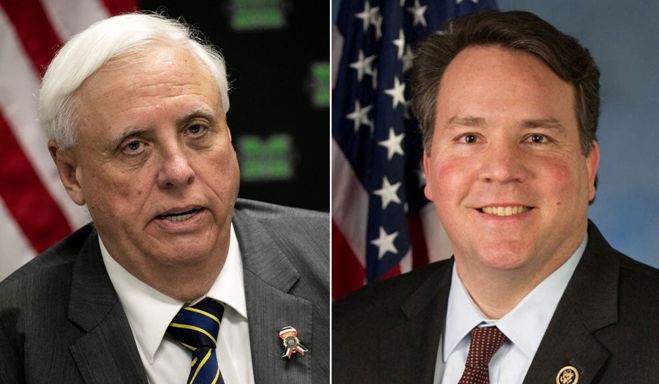 Photo credit: National Review
Photo credit: National Review
West Virginia, where energetic conservative Senate candidate Alex Mooney was swamped by doddering moderate Governor Jim Justice in Tuesday's Senate primary as was expected. "Terrifying and loathsome" is pretty much how the GOPe would describe Mooney. We'd describe him as "conservative". The GOPe would agree, and that's their main problem with the 5-term congressman.
Mooney was the first prominent Republican to enter the race against vulnerable Democrat incumbent Joe Manchin, who later tucked his tail between his legs, chose not to run for re-election and went on to briefly pretend that he could become President (or at least stop Donald Trump from being President, which is the most important thing to liberals and fake centrists).
The GOPe, namely Mitch McConnell and Steve Daines (his little toady who runs the NRSC) flew into a panic and dragged Governor Justice into the race by appealing to his ego, thus creating a potentially divisive primary, which is the kind of thing they claim to abhor -- when it suits them.
The latest results show Justice with 61.8% of the vote, while Mooney received 26.5%. Five others collected approximately 12%. With nothing to vote for on the Democrat side, since electable Democrats are all but extinct in the Mountain State (some, like Jim Justice, now label themselves as Republicans), numerous Democrats undoubtedly crossed over and voted in the Republican primary.
Mooney had the support and the endorsements of prominent conservatives like Rand Paul, Mike Lee, Ted Cruz and ex-Senator Jim DeMint; Justice had some semi-conservative endorsements (Marsha Blackburn, Tom Cotton), some moderate-liberal endorsements (Mitch McConnell, Shelley Capito [whose politician-son endorsed Mooney], Lindsey Graham) and some misguided endorsements from alleged conservatives (Donald Trump).
In the end, Justice also had the votes. West Virginia is now a very solidly Republican state; like many others which fit that description, it is in no way a solidly conservative state.
It's fashionable for liberal elitists to refer to West Virginians using words like "hillbilly" and "inbred" because, to them, hatred of White people is always acceptable. Though we reject their racism, it must be conceded that West Virginia politics does sometimes have a certain inbred-type quality to it:
In the CD-1 Republican primary, it was incumbent Carol Miller vs. former J6 political prisoner ("rioter", in biased liberal media parlance) Derrick Evans, age 39, who was briefly a state legislator before being forced to vacate the premises after his politically-motivated conviction in 2021. Miller, who won this primary with 63% of the vote, is a geriatric 73-year-old moderate currently in her third term in the House. She is the daughter of former conservative Ohio congressman Samuel Devine who was in Congress from 1959-1982. Miller's son, a car dealer by trade, was looking to extend the family's political dynasty by becoming Governor. However Chris Miller finished in third place in the 2024 GOP primary with about 20% of the vote and his political career is likely stillborn.
Arch Moore, a moderate Republican like Jim Justice and Carol Miller, many moons ago had a long and legendary political career including 6 terms in the U.S. House and two distinct stints as Governor (he ran 5 times and won 3). Moore was first elected to office in 1952 and last ran in 1988 when he lost his bid for a fourth term as Governor.
His daughter, Shelley Moore Capito, is a moderate-liberal Senate Republican and has been in Congress for nearly a quarter-century since being first elected to the House in 2000 in an upset victory over a megabucks Democrat trial lawyer who outspent her by a 6:1 margin. Justice's imminent elevation to the Senate in November will ensure that this solidly Republican state has two Republicans -- but no conservatives -- in that body for the first time since 1958. The last time West Virginia had two elected (as opposed to appointed) Republicans in the U.S. Senate was 93 years ago.
Capito's son, former state legislator Moore Capito, ran for Governor this year and came in second to state Attorney General and former Senate candidate Patrick Morrisey in the GOP primary. The younger Capito compiled a somewhat conservative record as a member of the state House of Delegates from 2016-2023.
Shelley Capito's nephew, state Treasurer Riley Moore (the true conservative politician in the family), won the 5-way primary to replace Alex Mooney in the U.S. House. After he wins the general election easily in November, it remains to be seen whether his voting record will be as conservative as expected. There's a good chance that he will at least start out that way, as many freshmen GOP legislators do.
Tags:
2024
Indiana
Nebraska
West Virginia
Maryland
|
|
7/18/2023:
[Montana] Meet the Republicans trying to beat Tester, Manchin, and other vulnerable Senate Democrats
[Washington Examiner]
|
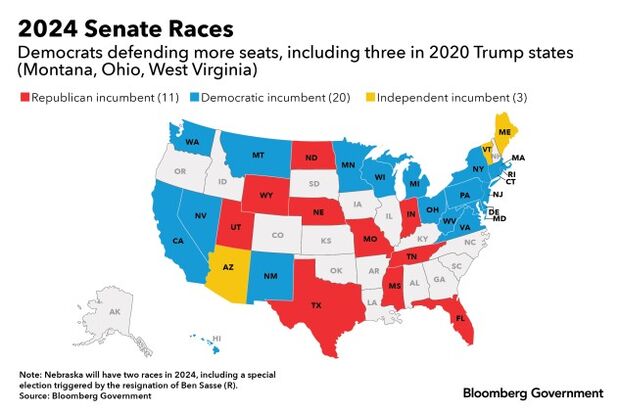 Photo credit: Bloomberg Government
Photo credit: Bloomberg Government
The first paragraph of the article, mainly telling us what we already knew:
Senate Minority Leader Mitch McConnell (R-KY) and Sen. Steve Daines (R-MT), chairman of the National Republican Senatorial Committee, have been working for months to recruit the most electable candidates in must-win swing states to retake the majority next year.
"Electable" of course means "someone who is a moderate/liberal toady for Mitch McConnell, like Steve Daines is". The liberal Republican establishment is sticking to the lie that the only reason why the GOP isn't in control of the Senate today is because of all the supposedly flawed candidates who lost in states like Arizona, Georgia, New Hampshire and Pennsylvania during the failed "red wave" of 2022. Add in other states such as Nevada which were ripe for a pickup and a couple more ridiculous pipe dreams (Colorado, Washington) and some lunatics seriously expected a GOP majority of something like 10 seats right now, 55-45 or so.
The party seeks to make sure that only approved Mitch Bitches get on the ticket for 2024, and no more "flawed" conservatives. When that strategy fails next November, the GOPe excuse will be that conservative voters didn't do their job and let the party down.
Here's a howler from the article, regarding Montana:
The establishment has "coalesced around former Navy SEAL Tim Sheehy's candidacy while privately dissuading Rep. Matt Rosendale from throwing his hat in the ring. Sheehy has the backing of Daines and Gov. Greg Gianforte (R-MT), while Rosendale has the backing of the well-funded Club for Growth despite not being in the race yet. Party establishment has said that Rosendale's 2018 loss to Tester proves he cannot win statewide."
Then the party establishment consists of idiots, liars, or both. You see, Rosendale, who is a far more conservative option than Squish Sheehy, in fact DID WIN STATEWIDE in Montana in 2020, by nearly 14 points against a very well-funded liberal Democrat to boot.
The article goes on to note that the GOPe is "staying out" of the primary in Ohio -- because they can easily see that the right-ish primary vote will be split between Secretary of State Frank LaRose and MAGA conservative Bernie Moreno, allowing liberal state Senator Matt Dolan to prevail by getting the primary votes of many Democrat infiltrators who will never vote for him in the general. Why should the GOPe interfere when things are going so well for them? You should already be well aware of the liberal machinations in West Virginia, with the GOP backstabbing conservative Rep. Alex Mooney in favor of doddering moderate Governor Jim Justice.
Now back to the "bad candidate" lie of 2022. True that the quality of some of the GOP candidates was less than great (Oz leaps to mind), but it's also been true for a long time that the GOPe will ensure that candidates it doesn't approve of (conservatives) will not succeed in general elections, and the best way to do that is to fail to support those candidates with $$$$ and thereby concede massive financial advantages to the Democrats.
Check this out from the key swing state Senate races in 2022:
Arizona: D spending, $192 million; R spending, $15 million
Georgia: D: $326 million; R: $69 million
Nevada: D: $64 million; R: $18 million
New Hampshire: D: $42 million; R: $4 million
Pennsylvania: D: $76 million; R: $49 million
Even in states the GOP won (barely) in 2022, Democrats still had massive spending margins over their Republican opponents; the Rats made sure that their ultra-liberal Senate candidates in Wisconsin and North Carolina didn't have to rely solely on their melanin advantages, and therefore they also had far more resources to work with than Ron Johnson or Ted Budd. In Ohio, J.D. Vance was outspent by close to 300% (!), but then Ohio isn't supposed to be a swing state so the Democrats theoretically needed to pump in tremendous cash just to have a fighting chance. Ohio will obviously be a lot tighter in 2024 than it was in 2022, and this time all that Democrat cash will be critical.
Looking at the financial picture as it is developing for the 2024 Senate races, in every state where the GOP can even dream of making a pickup -- including West Virginia -- the incumbent Democrat is starting out far ahead in the money race. Even where there isn't a Democrat incumbent who is running again (Michigan) the liberals are still miles ahead in geld. With it still being so early in the campaign season, perhaps that's not the most meaningful way to evaluate electoral chances because incumbents always start out far ahead.
Oh yeah?
The loony left has at most only two semi-realistic possibilities of taking a Senate seat from the Republicans in 2024 and in one of those -- Texas -- GOP incumbent Ted Cruz is already trailing his dumb-as-dirt opponent in fundraising, and that trend is likely to continue through 2024. The Democrats are laser-beam focused on taking Texas because once it finally flips from true blue to commie pinko red, any Republican has a 0.0% chance of ever winning another presidential election. Since the Rats can't make their presidential candidate (presumably Biden, for now) attractive to Texans, they are sinking tons of cash into the Senate race in the hopes that the coattail effect will work up the ticket as well as down.
Tags:
Senate
2024
Montana
Ohio
West Virginia
Democrat mega-$$$$ advantage
|
|
7/3/2023:
Senate rankings: five seats most likely to flip
[The Hill]
|
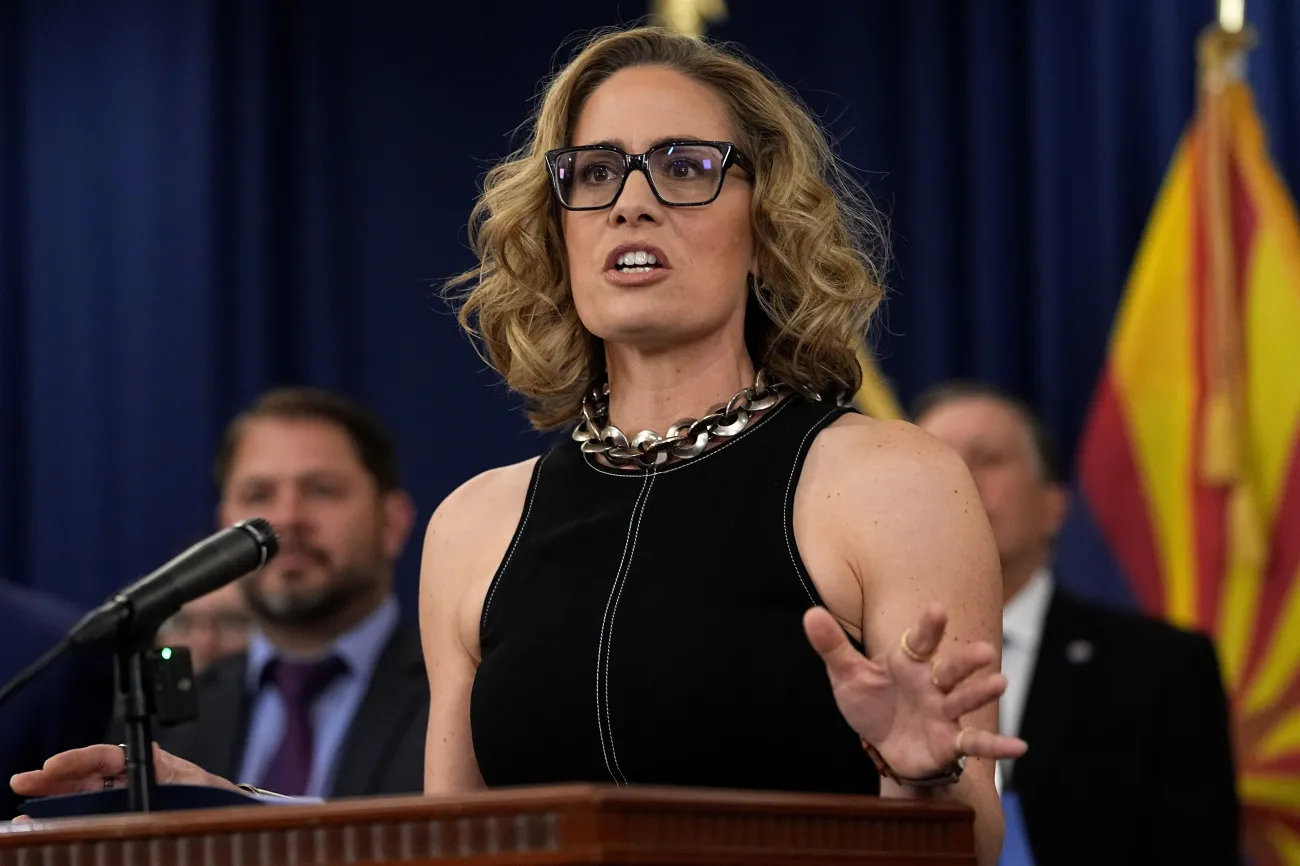 Photo credit: Matt York, Associated Press
Photo credit: Matt York, Associated Press
"The Hill", of all sources, contends that every one of the five most allegedly endangered Senate seats up in 2024 are currently held by Democrats! The five are: West Virginia, Montana, Ohio, Arizona and Wisconsin. We know that's hardly wishful thinking on the part of that leftist site, but are these pickups actually realistic or is this just a lot of crocodile tears to go with the veiled warning to Democrats to get busy doing whatever is necessary (wink, wink) to keep those seats, especially with Senate control at risk?
West Virginia: is supposed to be a slam-dunk pickup, perhaps with Joe "I've never lost an election in my life" Manchin deciding to keep his record intact by failing to run again and making the pickup a 100% certainty. The GOPe firmly supports moderate Governor Jim Justice and will do whatever it takes to prevent conservative Alex Mooney from getting the nomination. If Manchin really is as much of a "centrist" as some folks claim, the transition from Manchin to Justice in the Senate probably won't be very noticeable when it comes to their voting records.
Montana: The GOPe is rallying behind businessman Tim Sheehy, which probably tells you everything you need to know about this newcomer's politics. The question remains as to whether 2018 candidate and current congressman Matt Rosendale will enter the race. The Republicans lost Montana in 2018 for the same reason they lost West Virginia -- their candidate was attacked for the crime of not being born in the state (that plus some other Dirty Democrat Tricks, particularly in Montana). If Rosendale tries again in 2024 he'll do better than 2018, but he might be too conservative for his party's establishment.
Ohio: The GOP doesn't even appear to have a viable candidate. State Senator Matt Dolan is a liberal who got barely 20% of the vote in the 2022 Republican Senate primary, most of those votes coming from Democrats; Bernie Moreno is trying to paint himself as the MAGA candidate a la J.D. Vance, and will probably get a Trump endorsement if he can demonstrate a substantial lead in the polls. Ohio is not the solidly Republican state that the hopium addicts wish it was. For proof of that statement look no further than Sherrod Brown's past electoral successes, including 2018 when we were assured that Brown was toast because Trump won Ohio in 2016. Oops.
Arizona: Republicans can always count on a fair election in Arizona of course (LOL) but even if that really was the case their only hope here is for a 3-way race between the slimy "independent" incumbent (Sinema) a really slimy Democrat congressman (Gallego) and whoever the GOP nominates; that way the Republican could win with merely a plurality of the vote, and a plurality is probably the best they can do in this state these days. Some believe that Kari Lake will be back for a repeat of 2022. She was too good to be allowed to win then, and the same applies now. Whether it takes threats, bribes or both, Independent Sinema may not even choose to run for re-election, clearing the field for the Democrat nominee to very likely prevail next November.
Wisconsin: Rebecca Kleefisch, who would probably be Governor right now if it weren't for Trump's misguided and ineffectual endorsement of proven loser Tim Michels in 2022, would be a very good candidate and former Milwaukee County sheriff David Clarke would be good as well. Unfortunately, the GOPe is far more interested in millionaire candidates who will spend their own funds and not waste the apparently limited amount of cash the party has to throw around this cycle ("Pleez send us munney!"). Better still for the GOPe, the typical millionaire-type candidate often tends to be a squish although in this case Wisconsin venture capitalist Eric Hovde is described as a "conservative activist", at least by those on the left who hate him. So maybe he's not bad, but any Republican starts off as a clear underdog here.
Other possibilities, but don't hold your breath: There's Michigan, where incumbent liberal Debbie Stabenow is retiring in 2024 and will likely be replaced by well-funded liberal congresswoman Elissa Slotkin. There are a lot of GOP possibles to take her on, but none of them are serious threats to win. Except perhaps former Detroit police chief James Craig, who tried to run for Governor in 2022 but made the rookie mistake of having Democrat operatives in disguise gather signatures for him, which were deliberately falsified and Craig was kicked off the primary ballot at the last minute, leaving nothing but a field of underfunded and outclassed twerps on the Republican side. Hopefully he'll be smarter this time around.
Then there's Nevada, where the current Democrat Senator barely got 50% in 2018 against former Republican incumbent Dean Heller, who ran screaming to the left in a failed effort to keep that seat. The string-pullers on rare occasions allow the GOP to win a close election in Nevada (e.g. 2022 Governor) when the Republican candidate is acceptable to the left. If Sam Brown or Jim Marchant becomes the Senate nominee: (a) either one would make a great Senator, therefore (b) that is not going to be one of the few times the puppetmasters will allow the Republicans to win a statewide general election in Nevada although the result would likely be close. The GOP could simply nominate an eternal loser such as Adam Laxalt or Danny Tarkanian again, at least that would remove any suspense regarding the outcome.
Tags:
Senate
2024
West Virginia
Slam dunk
Montana
Ohio
Arizona
Wisconsin
Wishful thinking
Michigan
Nevada
|
|
4/26/2023:
[West Virginia] Joe Manchin is a dunce
[Hot Air]
|
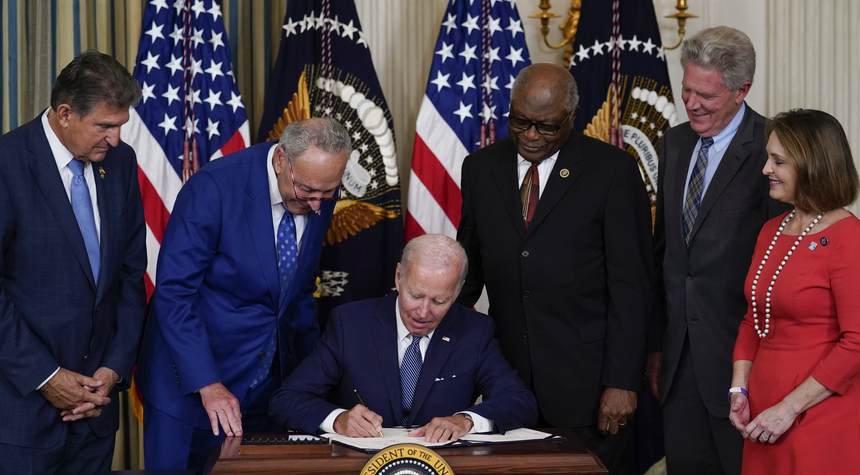 Photo credit: AP Photo/Susan Walsh
Photo credit: AP Photo/Susan Walsh
Actually, that's one thing he's not. The article claims that Manchin is regretting his high-profile vote which singlehandedly provided the margin for passage of the Democrats' ludicrously-named "Inflation Reduction Act" last August. But he knew exactly what he was doing at the time, and only now that the 2024 campaign season is beginning to get underway is Manchin feeling a little heat at home in West Virginia. He pretends to be a thorn in the side of his party, but when the chips are down he always comes through for the leftists.
Republicans are lining up to take Manchin on, the first one was solidly conservative representative Alex Mooney. The liberal GOP establishment therefore went into a panic, but calmed themselves down by successfully recruiting term-limited Democrat-turned-Republican Governor Jim Justice to oppose Mooney in the primary.
The RINOs and their big $$$$ donors are now able to run away from Mooney and toward Justice. Donald Trump should endorse Mooney to give Mooney's campaign some traction, but apparently that's too much of a risk to the all-important Trump Winning Percentage since Mooney is unlikely to survive the primary.
Aside from his conservatism, the RINOs' problem with Mooney is that he wasn't born in some rural hovel in the geographical center of West Virginia and therefore is doomed to always be considered an outsider like Patrick Morrissey was painted as when he ran against Manchin and lost -- basically for that reason alone -- in 2018. Morrissey has since been elected to statewide office in WV, and is running for Governor in '24 and will probably win, so the voters seem to have forgiven him for the sin of being born elsewhere. Will the voters also forgive Mooney? We very likely won't get to find out this year.
The fear is that Manchin and the media would use the same playbook against Mooney that they did against Morrissey. They also fear that Mooney is "unelectable" even in this bluest of blue states because they feel (and wish, and try their best to ensure) that all conservatives are unelectable.
It's a moot point because no way the establishment lets Mooney win the GOP primary if Justice is in the race, and maybe even if he isn't. Given that Justice will be the nominee, at this time we feel he has about a 60-40 chance of defeating Manchin. Manchin is as slimy as they come, but West Virginia voters have been fooled by him in the past and may be again in the future. Also Manchin is a good campaigner -- good enough, anyway -- and most Republicans are not. Justice won in 2016 (as a Democrat, prior to switching parties) by "only" 7 points, but the next truly tough election campaign he faces will be his first one.
If something from way out of left field happens and Mooney is the nominee, it wouldn't be surprising at all to see the state's other Senator (alleged Republican Shelley Capito) all but endorse Manchin by talking about how delighted she's been to serve with him, how wonderfully "bipartisan" he is, etc. Other RINOs will also pull out the knives and aim for Mooney's back; Mitch McConnell will see to it that Mooney is starved for funds. But as stated above, that scenario is very likely something we won't have to worry about.
Tags:
Phony "moderate"
Joe Manchin
West Virginia
2024
Alex Mooney
Conservative
Jim Justice
RINO
|
































